#not the same but pretty similar
Explore tagged Tumblr posts
Text
hello beautiful people! i have decided to make this for anyone looking to get into a new sport, and here is my pitch your new sport should be hockey! i present to you; an intro to hockey (for footie fans)
*warning: this is long! very long! i would appreciate it if you read the whole thing, but you dont have to, mwah!*
the sport
ice hockey is a sport played by players on skates on a surface of ice. i will be referring to it as hockey from here on, because (and no offence to field hockey at all) ice hockey is the ultimate hockey and it would be blasphemous to refer to it otherwise! in hockey, there are two teams on the ice, and each player uses a stick (commonly made of carbon fiber, usually as tall as the player’s nose) to control a rubber puck to get it into the opposing team’s net. the ice is surrounded by boards (the white part covered in ads at the bottom) and the glass (the glass on top) and there is netting on top of the glass behind each net to prevent pucks from going into the stands

KEY POINTS
there are four positions in hockey: goalkeeper (goalie), defender (dman or simply d), winger (either left wing or right wing), and center
defence and goalies perform basically the same role as in footie (and there is no equivalent of a midfielder), but along the attackers the roles are reversed. the center is usually the playmaker who can track back to defend and create plays, while most wingers are known as goal scorers. that said, because there are only 5 players on the ice at a time, there is no “pure goal scorer” or stiker equivalent because there simply is not space for one on a team, everyone needs to create and score. there are 4 lines of forwards and 3 lines of defense that rotate on and off the ice, with the best players on the top line or on the top d pair
games are 60 minutes with 3, 20 minute periods. in between each period is a 15 minute intermission in professional games. the clock stops every time the whistle is blown, so there is no such thing as injury/stoppage time (because we just… stop the time). players don’t play the whole game, they play in 30 second to 50 second shifts. the best forwards usually play between 18 and 23 minutes a night, top defenders play between 25 and 30 minutes a night. goalies are the only ones that play for a full 60
after every whistle, the game restarts with a faceoff, which is like a tip off in basketball. the two centers face eachother and the ref drops the puck in between them and the centers try and pass it backwards to their teammates
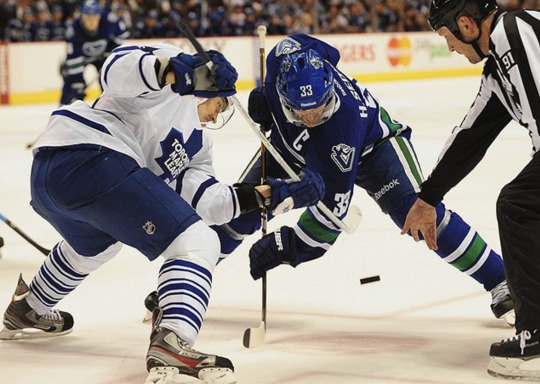
there are no such thing as ties! ever! they got rid of them in 2005. if teams are tied after 60 minutes, they go to a 5 minute, sudden death overtime. first to score wins and the game is over. if teams are still tied, they go to a shootout (basically penalty kicks)
equipment is worn by all players including a helmet, neck guard, shoulder, elbow, and shin pads, “pants” (basically thick shorts that protect the thighs”, gloves, and skates. also they have their sticks

the rules
there are a couple main rules of hockey, some which are the same as footie (offsides are equally hated in hockey). if you break these rules, there are four kinds of penalties that can be called. these penalties result in a skater going to the penalty box (the box) for a certain number of minutes, so the other team has one extra skater. this is known as a power play for the team with an extra skater, and for the team with a guy in the penalty box, it is known as a penalty kill. there isn’t really a build up of these penalties, like one guy can get 5 or 6 in a game and still be ok to play. the least amount of people that can be on the ice is 3, so the biggest advantage is 5 players on one team and 3 on the other. minor penalties end when time is up or the team on the powerplay scores (whichever comes first), and majors end when time is up even if the other team scores.
(naughty boys sit in the time out box)

types of penalties
two-minute minor: minor penalties and the player goes to the box for 2 minutes. examples are tripping (when you trip another person with your stick), elbowing (when you elbow someone), slashing (when you take your stick and slam it on someones wrists), roughing (a minor fight) or even diving
four-minute double minor: this is just a bad minor where the person gets a minor injury, the best example is high sticking (where you hit someone in the face by lifting your stick over shoulder level), where you can get a double minor by making the other player bleed
five-minute majors: when an action results in an intentional injury, especially bleeding, or a fight (big fights, like ones that involve gear coming off and punching the other person’s head into the ice, is what gets a major). best example is cross checking to the head, which is when you use your stick to hit someone in the back of the head/neck to push them down to the ice (very fun)

game misconduct: ten minute penalties that get you kicked from the game. this does not result in a power play or penalty kill, you just get kicked out until 10 minutes is up. idrk this one, its pretty rare and so the refs usually just explain the circumstance
penalty shot: exactly like a penalty kick in soccer, it happens when a penalty occurs when the player is on a breakaway. this is very very rare
refs
depending on the ref, you can get away with a lot more or a lot less. theres a phrase called “putting the whistles away” which occurs in big games usually where refs don’t call penalties. refs also call penalties sometimes to “even out” the amount of penalties each team has. depends on the guy
amount
usually, each team gets about three penalties a game, sometimes more sometimes less
the leagues and the season
there is only one really big professional league (we will call it the champions league equivalent), the national hockey league (nhl) that plays in the us and canada. there are several smaller pro leagues in other countries, such as the khl (russia and eastern europe with one team in china), the shl (sweden), and liiga (finland). this section will talk about the nhl, but im pretty sure it is the same or very similar in the european leagues as well
divisions
the league is split into 2 conferences, east and west with 2 divisions in each conference. each division has 8 teams.
east has the metropolitan and atlantic divisions, and includes all teams on the east coast of canada and the us, such as the pittsburgh penguins, the tampa bay lightning, and the toronto maple leafs
west has the central and pacific divisions, and includes all teams in the middle and on the east coast of canada and the us, such as the colorado avalanche, the vegas golden knights, and my vancouver canucks

regular season
regular season is made up of 82 games, and these games are used to get points to make it into the playoffs
points: a win is 2 points, a loss in overtime or a shootout is 1 point, and a loss in regular time is 0 points
playoffs
the top three teams (points wise) in each division, as well as two wild cards from each conference go to the playoffs (16 teams total). they compete in a four round bracket to get to the final (like the world cup without the group stage)
each playoff series is a best of 7 series, so you have to win 4 of 7 games to win the series. the games alternate, two at home, two away, and then home away home. sometimes, teams have to travel between the two stadiums overnight (and they can be as far away as like 3,000km!)
being “swept” is when you don’t win a single game and get eliminated 4-0 on aggregate (which is on wins, not goals). if your team wins 4-0, you “swept” the other team
game 7: game 7 in the stanley cup playoffs is the best hockey you will ever see. two teams at the peak of their powers with everything on the line. its like a champions league final.
the stanley cup, or the cup, is the trophy that can be one. there is no “keeping” the cup, there is only one and it has every player, coach, and manager’s name who have ever won the cup on its surface. there are various bands, and when one runs out of space it is “retired” in the hockey hall of fame in toronto, canada. its a pretty cool trophy
cup days is the day each player on the winning team gets to spend with the cup. they take it to their hometowns usually, they have been taken to childhood rinks, churches, mosques, on boats in lakes, on helicopters, and of course, people eat and drink out of it!
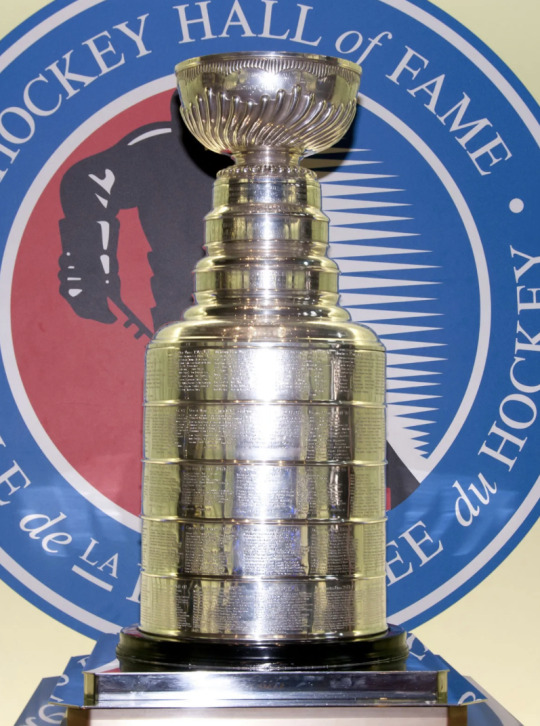


other fun facts that i think are cool
goalies: goalies can be “pulled” during the game to add another skater on the ice. this usually happens during a powerplay (for a 6 on 4 advantage) or during the last few minutes of the 3rd period when a team is down by 1 goal. this results in an empty net, and two things happen: the team with 6 players uses the extra player to their advantage and scores, or the team with less players just chips the puck down the ice and scores in the net (called an empty netter)
goalies also have the protection of the team, if someone hurts the goalie the whole team will fight them. goalies are precious and deserve hugs. hug your goalie yall


international hockey: because of politics between the ioc and the nhl, nhl players haven’t played in the olympics since 2014. there also was a hockey world cup, but that has only been held 2 times (in 2004 and 2016) and there are no plans for a return until 2024 at the earliest. this is a sensitive subject, and it is bad for the sport, but no there isn’t really an international, best-on-best tournament in hockey at the senior level right now
world juniors: there is one at the u-20 level though! the world juniors happen every year from december 26 to january 6 or 7, and it is the best players from each country under 21. usual countries that participate are canada, us, finland, sweden, germany, czechia, slovakia, switzerland, luxembourg, and latvia. russia was also involved, but has been excluded due to the war in ukraine.

relegation: there is no such thing! everyone stays in the nhl. in order for teams to stay balanced, there is a salary cap (a limit to how much money you can be paying players each year) which i think is $88 million right now, so all teams have to spend the same amount.
the messi/ronaldo rivalry: there is a hockey equivalent (i mentioned it in a previous post about hockey), which is the sidney crosby/alex ovechkin rivalry. they have been competing since 2005, and they are actually the same ages as ronaldo and messi too. they are both phenomenal, and there have been some historic fights and games between the two over the years.

longevity: because it is such a high contact sport, the longevity in hockey is a lot less. it is better now, but most players retire between 33 and 38, with goalies usually retiring later and defencemen (who usually get into fights) retiring earlier.
goals and assists: goals and assists are valued equally in the nhl, both called points. a point is a goal, an assist, or a secondary assist (you passed to the assister). most nhl games have an average of 6 goals a game, its quite high scoring, although this season the highest scoring game was 10 to 4. some games go to shootout and end 1 to 0.
in shootout, it isn’t like footie where it would show the score as a tie and then the number of shootout goals that went in, it shows the winning team’s score as if they scored another goal and where it would say “FT” it would say “SO” for shootout. for overtime, the score would show “OT”.
where to watch the nhl
most hockey games start at 7pm local time, which are local timezones across north america (pst, est, ct, and mt). you games for free on websites like atdhe.tv internationally, and if you are in the us and have an espn subscription, you can watch it there (im assuming you haven’t read this far if youre canadian lol). there are between 2 and 15 games every night from october until june, it is so much fun and there’s so many options!
if you’ve read this far i love you and i hope you want to watch hockey now! i would love to talk hockey with anyone who wants to learn more! mwah ily besties 😚🫶
#k talks hockey#k the hockey prof???#hockey for my footie friends#k converts her footie friends to hockey friends!#if you read this whole thing i might just have to kiss you 😚🫶#please please let me know if you like this and this is helpful#i love talking hockey#this also doubles as an intro to canadian culture ig?#hockey is to canada similar to what footie is to south america#not the same but pretty similar#enjoy besties 🫶
36 notes
·
View notes
Text

I know those eyes.
[First] Prev <–-> Next
#poorly drawn mdzs#mdzs#wei wuxian#wen qing#wen ning#Sibling similarity but you only see it when you realize they have the same soggy eyes.#These two always struck me as a bit of a play on Jiang Cheng and Jiang Yanli for 'siblings who contrast each other.#But after spending a lot more time marinating on Wen Ning I actually think they are way more similar that is initially apparent.#Sure their surface level personality traits are pretty contrastive. But they both are so willing to risk their lives for what's right#Who raised them? In a story so full of examples of how parents shape their children - why are these two lacking in parents?#I imagine that Wen Qing is the older sibling and so her morals of 'help those who need it no matter who they are' got passed a long.#But how did *she* arrive there? Was that instilled within her or was it a reaction against bearing witness to callousness and cruelty?#We'll never know..the only thing I can say for certain is Wen Qing is *so* soggy in the audio drama.#She's like the ant with the bindle. It's a hell of a way to bring a previously sharp tongued character back into the narritive.#Side note: Thank you all for being so patient and kind while I took my break!#It's been a very chaotic few weeks and I didn't realize how bad my burnout was getting. I'm back and ready to keep drawing again!
2K notes
·
View notes
Text
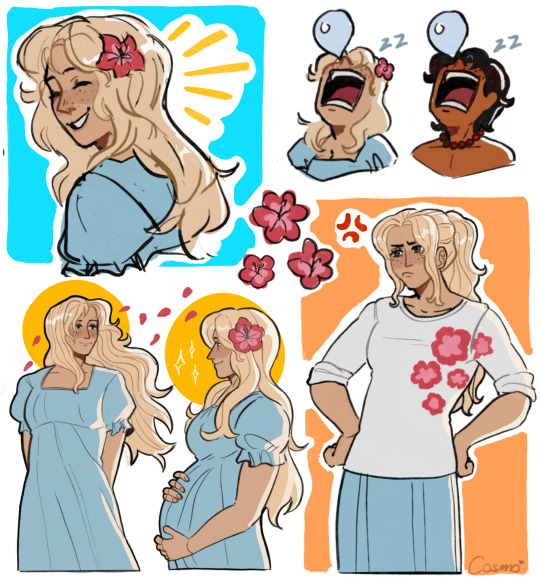
The real reason Oda had to get rid of her was not for plot convenience, but bc she would have kicked everyone’s ass. (Source: trust me bro)
#Art block auggh but must draw pretty lady aauugghh#also fr thought you mean to tell me this lady with the D. in her name wasn’t out here being an absolute menace#like I feel like she and Roger had to be in the same wavelength of fuckass crazy like cmon now#Rouge and Roger backstory when? (I am delusional)#also her being portrayed as this saintly dead mother figure feels very strange to me. boo to women being killed for plot convenience🍅🍅#also I really tried to draw her similar to how I draw ace bc he is literally a mammas boy#copy and paste of his mom with his dads hair#AGGGHH I NEED MORE OF HERR#AND IF I CANT HAVE MORE I WILL MAKE MORE💥💥#art#digital art#my art#fanart#drawing#digital illustration#one piece#portgas d ace#portgas d rouge#rouge#op#one piece fanart
6K notes
·
View notes
Text
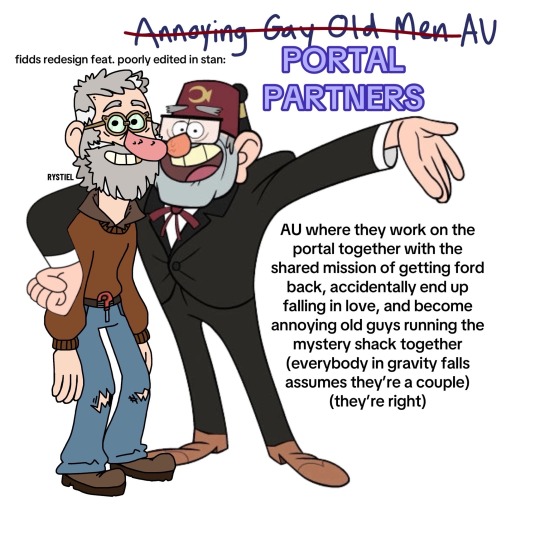
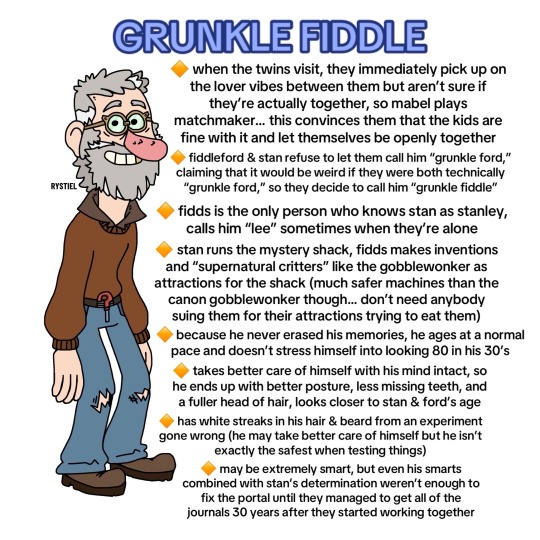
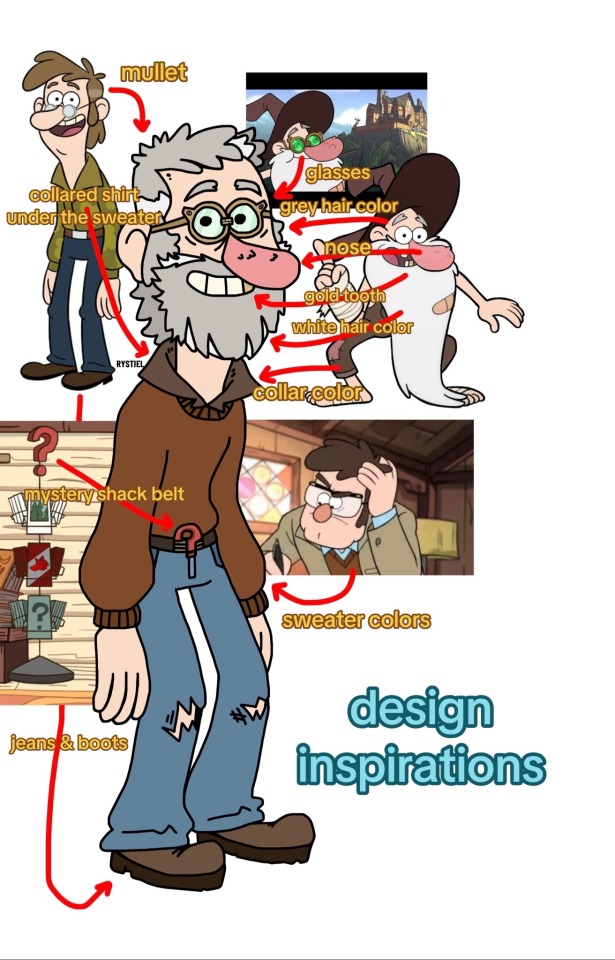
idk what we’re all calling the concept of fiddlestan working together but i’m calling my version the portal partners AU 🙏🏼
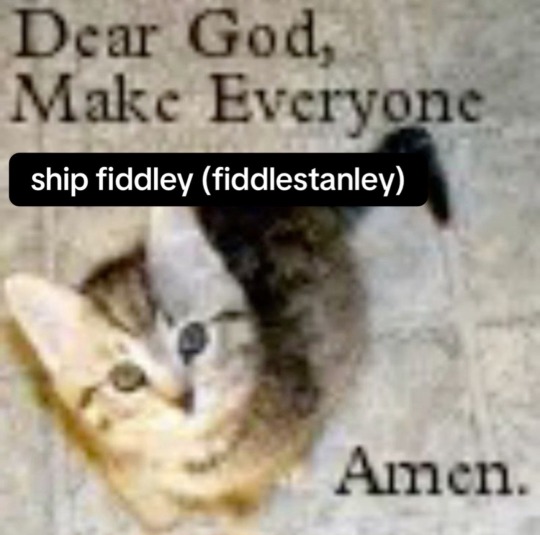
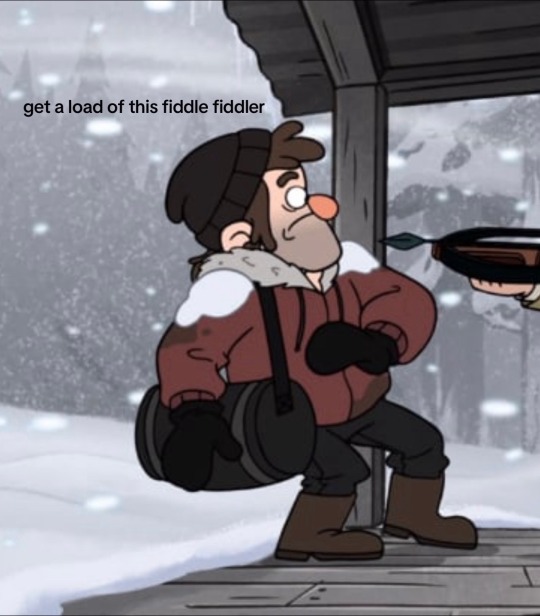
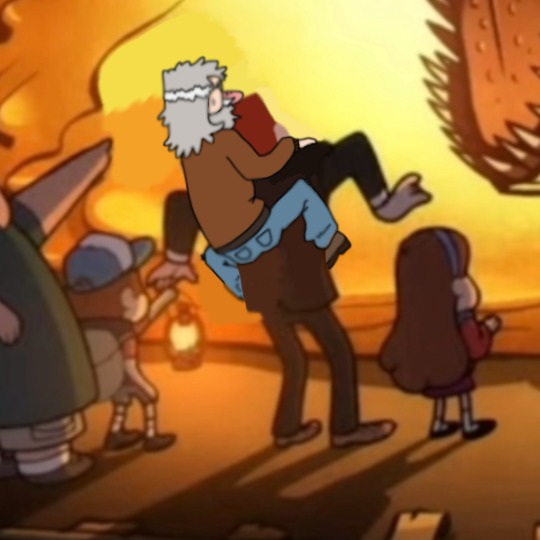
#gave it a name bc i was kinda tired of calling it the Fidds and Stan Work Together on the Portal AU#it’s called portal partners bc they’re partners in fixing the portal partners in running the shack AND partners in life#ik i’m not the only one to think of an au where they start working together after ford goes missing#but i don’t see a lot of people really showing the older version of them ? i don’t think ?#like i’ve seen canon older fiddlestan but not older fiddlestan after working together for 30 years ? idk#also figured fidds would look different in a world where he doesn’t lose his mind in his 30s#🤷🏻♂️#gay old men#yay#stan looks and acts the same btw he just happens to also have a very longterm bf to be gay with#gravity falls took place before gay marriage was legal (jesus christ that’s crazy to think about) so that’s why i say very longterm bf#(this means ford would be back in time to attend their wedding tho so. best man ford real. fidd & ford may be sort-of-exes but it’s fine)#gravity falls#gravity falls au#fiddlestan#also… petition to start calling fiddlestan fiddley#bc fiddle(ford) + (stan)ley …. fiddley… u see the vision????#fiddley#🙂↕️🙏🏼#stanley pines#fiddleford mcgucket#gravity falls fanart#idk man i’m gonna tag the au too ig#portal partners au#gravity falls portal partners au#???#my art#(i guess? used a fidds base then redrew it with my changes so idk)#rystiart#sorry if someone’s done smthn similar bc i feel like this idea of them working together is pretty popular maybe 😭
543 notes
·
View notes
Text


3.02 -> 3.08

#i was f-ing around with blending and i think i made smth pretty??? 🥺#polinsated#bridgerton spoilers#polin spoilers#bridgerton#bridgerton 3x02#bridgerton 3x08#polin first kiss#colin bridgerton#penelope bridgerton#colin x penelope#polin#polinedit#polin kiss#bridgertonedit#black and white#polin parallels#userjamiec#....#these kisses are so similar but so different#got me thinking about mr miyagi ->#'different but same'#gifs by polinsated#colouring by polinsated
1K notes
·
View notes
Text
Actual Ultimate Classpecting Guide
For real this time.
Buckle up, this is a really long one. For everything that's posited, I can provide textual evidence; that being said, I'm not going to be including the textual evidence within the essay itself, because it's already long enough as-is. As such, please feel free to ask for clarification or sources on any assertion, and I'll do my best to provide.
Before we begin, there's some things to discuss about how we're going to be approaching classpect in the following essay. In numbered list form for our short attention spans:
1. There is a concept Hussie talks about multiple times in his book commentary, "personality alchemy" - the idea that there are these "platonic ideals" of certain characters, which can be mixed and matched with others, in order to create new characters. The examples he gives are of how Eridan was a proto-Caliborn, how Kanaya has shades of Jade, how Nepeta was a proto-Calliope, and how Sollux and Eridan have shades of Dave in them. Classpecting is fundamentally a form of this personality alchemy:
2. Class describes the character's arc and emotional hurdles, while Aspect describes the character's base personality traits by which this arc is experienced.
3. For example, all three Seers struggle with hubris: Rose's need to be the smartest person in the room led to her being manipulated by Doc Scratch, Terezi's obsession with meting justice led to her engineering a situation where the only option was to kill Vriska, and Kankri's desire to be seen as a spiritual leader amongst his friends led to him furthering their divisions and harming them.
Then, when their pride is shattered, they cope by inflicting willful self-blindness: Rose turns to drinking herself stupid (the opposite of Light's sway over knowledge), Terezi gets down with the clown (the opposite of meting out Mind's justice, as it's a Gamzee W), Kankri goes celibate (Blood L) despite his clear romantic feelings for certain teammates.
4. As for Aspect: note how all three Life players share the personality traits of optimism, stubbornness, and obstinacy. All three Breath players share an immaturity and naïvety, and are quite frankly irresistible to people for some reason. All three Light players share a need for the spotlight and a tendency toward long-windedness and persnicketiness. So on and so forth.
What's interesting is, if you start analyzing characters that share Classes and Aspects, these specific types of similarity crop up over and over - all our Knights struggle with insecurities and facades, both our Bards have a crisis of faith. All three Breath players have an aspect of immaturity and childishness to their characters, and all three Light players are deeply concerned with appearing intelligent and feeling important.
5. As a result, this guide is NOT intended for classpecting real life people, because we are complicated, we contain multitudes, and we don't have arcs. This is primarily an analysis of what Class and Aspect mean in Homestuck based on textual evidence, because I genuinely believe that you can basically figure it out if you read carefully.
6. Duality, and the idea of "equal and opposite," are major themes within Homestuck - Prospit and Derse, Skaia (described as a crucible of birth and creativity) and the Furthest Ring (the literal afterlife). Which classes are involved in an Active/Passive split, and opposing Aspects, are the same way. This is the primary method I used to determine the Active/Passive pairings and opposing Aspects. After all, as Callie describes, both Thieves and Rogues are classes "who steal" - so, too, do I try to unify Classes by a common theme, even if they diverge wildly in how that theme is expressed (as Thieves and Rogues do). In the same way as the opposite of "up" is not "apple," but "down", because "up" and "down" are both fundamentally concerned with relative vertical position, so too can be defined concepts like Breath and Blood, Hope and Rage, Light and Void - as well as the reasoning behind Class pairings like Heir and Page, Maid and Knight, and Seer and Mage.
7. Descriptions for both Class and Aspect are left deliberately vague and up to interpretation within the comic itself, and this is by design: the actual manifestations of an Aspect can vary wildly given the Class, and even individual person, that it's tied to. Calliope even makes note of the fact that, under the right circumstances, someone can manifest effects that appear to be the opposite of their aspect. She's also careful to couch her language in "may" and "can" - because these concepts are intentionally somewhat nebulous and malleable. As such, while this guide certainly lays down what can be gleaned and inferred from the text, do note that Homestuck runs on a soft magic system, and as such, nothing stated is firm, 100%, must-always-be-this-way - just an overview of what we've seen.
8. There is often great overlap between Aspects, Classes, and Classpects - which Calliope herself notes. Heart and Blood are one of the most salient, as they both have a fixation on relationships, and Calliope mentions that under the right circumstances, a Classpect may even be able to manifest what appears to be the opposite of their Aspect. Again, Homestuck operates on a soft magic system, so this is a feature, not a bug.
ASPECT
There's a little less to say about Aspect, not because it's less complicated, but because "base personality traits" are much more nebulous compared to Class's sway over character arc. Still, Aspect represents the fundamental way a character is, and thus, color every interaction that character has. There's a reason Ultimate Selfhood is sought through Aspect, not Class - Aspect is the core of the character's being, what makes that person that person.
That all being said, Class has major sway over how an Aspect manifests, and certain classes can even invert the Aspect and even the character's role in the party. As such, these descriptions must be parsed carefully in relation to Class. Moreover, due to the soft magic system, there is at times overlap between unrelated Aspects, which can also be exacerbated by Class - Heart and Blood being the most obvious in this regard. Still, overall, you'll find the Aspects to be fairly distinct from one another.
Please also note that every Aspect can deal with its literal counterpart by default - Light players can wield lasers, Breath players can wield the breeze, et cetera. Because this kind of goes without saying, and because the non-literal stuff is more interesting to discuss, I'm not really going to go into too much detail about the literal qualities.
Finally, something interesting to note is that nearly every Aspect follows its own Hero's Journey cycle - full actualization for each one usually means reaching around to its opposite Aspect, and taking lessons from them - for example, Breath players need to learn maturity and responsibility, while Blood players need to learn relaxation and whimsy. Thus, an Aspect at its worst manifests in two ways - either a toxic overabundance of the Aspect's worst traits, or such a dearth of the aspect that it begins to resemble its opposite. Only by reaching into the opposite, however, can the player be tempered and reach full maturity - can they become more of who they are.
SPACE / TIME
Space and Time are both concerned with physical reality, goals, and the way one approaches them.
Space is associated with "the big picture" - with recycling, reproduction, and the interconnectivity of all things. The aspect also presides over the enjoyment of the journey over the destination - Space players serve as reminders that the present moment is as important as the end goal. Space is often a more passive Aspect, being the stage upon which the story is set. They're the hosts of the party, and the one who marks the ending.
Its players reflect these tendencies, often being feminine, with penchants for life-giving acts such as gardening. Their personalities tend towards frivolity and silliness, finding it difficult to stay on-topic or bring full gravitas to serious situations. Perhaps a better word would be "distractable;" when the aspect is so concerned with all things in connection with each other, it's easy to lose track of details, and it's easy to enjoy things simply as they come. Space players tend to be kind, patient, and forgiving, which is a strength as much as it is a flaw; it's easy for malicious actors to take advantage of this compassion, or for the Space player to find themselves in a poor situation by being overly permissive. They can easily be painted over by stronger personalities, and tend to struggle with romantic relationships, as they attract many with their kind and giving natures, and few are naturally so considerate of the Space player in turn.
"Passive" is a good word to use; at a toxic overabundance of their Aspect, Space players are trampled underfoot. They become enablers, servants to dark forces, or so lost in their own worlds that they neglect the one they live in. With their Aspect "inverted," a Space player becomes a demon of poor prioritization. Distracting not just themselves from their true purpose, but others, too, the Space player will wreak havoc by overemphasizing unimportant topics and ignoring important tasks. This superficially resembles Time, in that the Space player will become fanatically dedicated to their task, but note that the poor prioritization is still Space-esque at its core.
Still, within this nadir is a valuable lesson: the strength of self-assertion, and the determination to see a goal through. These will allow the Space player to weed their garden, separating good from bad, allowing it to flourish like never before.
Time, in contrast, is associated with "the little things" - with details, minutiae, and processes. Time presides over the struggle toward something greater, the endurance of hardship with an eye on the prize - the destination over the journey. Time players are the ones keeping track of the tasklist, marking off each item as it reaches completion; they are the tireless workers keeping the whole engine running.
Time players, thus, are ones whose lives are marked by struggle. They are highly goal-oriented; in contrast to how Space players can easily move from goal to goal, task to task, Time players feel bound to see things through to the end, finding satisfaction only when they've achieved their desired result - and only until they come across the next goal in their journey. A Time player isn't happy without a goal to work towards, a craft to polish, a prize to win - but this driven nature can easily be its own downfall, as it leaves little room for the player to admit to their own shortcomings, or ask for help from others. Moreover, their focus on minutiae can leave them blinded to the bigger picture, and it's easy for a time player to fall to despair, able to do nothing more but spin their wheels. They're prone to directionless anguish, frustration, and resentment towards the seeming futility of their actions, becoming destructive and defiant even when it doesn't serve them to do so.
At a toxic overabundance of their Aspect, Time players become explosively destructive. The ultimate "goal" of all things is death, with which Time is associated, and accordingly, Time players have a penchant for aligning themselves with futility and entropy, struggling so hard that their thrashing leaves a trail of annihilation in their wake. With their Aspect "inverted," Time players detach entirely - they can become so fed up with struggle that they simply opt to lay their weapons down and let the end take them. It's very easy for them to come to the conclusions that either everything matters, or nothing matters. This superficially resembles Space and its big picture thinking, but note that its framework of struggle, and whether or not a goal needs to be pursued, makes it a Time concern.
But the inherent meaninglessness of existence is, in itself, an important realization to make - that whether or not anything "matters" in the grand scheme, things can still be worth doing, worth caring about, and worth investing in. This realization allows the Time player to attack their goals with renewed vigor and greater clarity, which in turn means that the party becomes an efficient, well-oiled machine.
BREATH / BLOOD
Breath and Blood are both concerned with directionality, interpersonal relationships, and autonomy.
Breath is the Aspect governing freedom, liberty, and independence; it is a force that breaks shackles, clears out social norms, and refutes "the rules," whatever those rules may be. Breath players can't be tied down, whether by physical bonds, societal rules, or even the ineffable forces of the narrative itself. They are leaders of example, pioneers, and trailblazers, opening new paths for their teammates to follow.
Breath players are goofy and gullible, often with hearts full of childlike whimsy, naivety, and even immaturity. They are friendly and well-meaning, fond of simpler things, and easily swayed by others. They approach the world with a sincere and innocent good-naturedness, like a baby animal before it learns to be fearful of danger. Something about this sincerity seems to make Breath players irresistible to others, and they often find themselves the subject of romantic attraction. However, in this childishness is also the great pitfall of many Breath players - their natures are naturally conflict-averse, and egotistical the way a child can be, failing to see beyond themselves. They can be incredibly callous when not considering the consequences of their actions, or the viewpoints of others.
At their worst, Breath players are irresponsible and callous. They'll shirk the consequences of their actions, blaming anybody but themselves, or simply choose not to care who they hurt in order to get what they want. They may even choose to stop making choices for themselves, leading to the "inversion" of their Aspect - a voluntary loss of freedom and independence, derived from an Breath-like aversion to responsibility, which superficially resembles the bondage of Blood.
But if they are able to overcome these tendencies, a Breath player will learn what true responsibility looks like - responsibility for themselves, their choices, and the effect they have on others. Armed with this, a Breath player's ability to break bonds can be focused into a clear force for good, clearing away all obstacles and harmful societal standards, leading the charge into something new and beautiful.
Blood, in sharp contrast, is the aspect that governs bondage, contracts, and interdependence. It is a force that binds. Under Blood's sway are not only romantic entanglements, but familial, friendly, and societal ones as well. This aspect sees overlap with Heart, but the division is this: Heart concerns itself with feelings, and Blood concerns itself with compatibility. Blood players are diplomats, forces that remind us all that we are more similar than we are different, and that that similarity should bring us together when we are on the verge of pulling apart.
Blood players, reflective of their Aspect's association with bonds, tend to be neurotic and obsessive. They have a tendency to over-examine and overthink, constantly fretting over the infinite and infinitesimal variables that influence the shape of society and interpersonal relationships. However, this judgmental nature stems from a deep well of idealism and empathy; Blood players can't help but care about others and wish for the best for them. In a way, this makes them one of the most mature members of the team, being concerned with its overall well-being. Unfortunately, their prowess does not extend inwards, and their assessment of themselves is usually direly incorrect - all the worse because Blood players always feel responsible for those around them. Blood, being the Aspect concerned with interdependence, is the weakest one when all alone.
Thus, it's easy for the Blood player to wind up controlling - desperate to make sure everyone is moving according to their vision, they'll become iron-fisted dictators, with a "my way or the highway" approach to social interactions. It's easy for them to wind up pariahs of their own making, becoming so critical of others, or so adamant about enforcing their own will, that they inadvertantly sever their ties - something that superficially resembles Breath's independence, but is truly a result of Blood's neuroticism.
But with that space and separation can come great clarity. Blood players must learn to relax their grip, and allow people room to breathe - including themselves. Once able to grasp that sometimes bonds must be forged with a soft touch, Blood players' natural empathy shines through, allowing them to build something so much kinder and greater than the sum of its parts.
LIGHT / VOID
Light and Void are both concerned with knowledge, ontology, and "narrative relevance".
Light (as well as its counterpart) are perhaps best understood through the lens of "narrative" - this idea that, of all things that do and don't exist, and all events that do and don't happen, only the ones put to page are "relevant". Thus, Light is associated with knowledge and luck - that is to say, it's associated with the knowable, the objective, and the concrete, and the ability to determine "important" events. Light players have read the book they're participating in, and able to serve as luminary guides from one plot point to another, lighting the lampposts for others to follow.
Light players, naturally, are erudite and educated, possessing keen intellects and cunning minds. They are fond of knowledge itself, of markers of status and prestige - whether that's wealth, the adulation of the masses, or a massive library. They harbor a desire to be important, to be seen, to be acknowledged, and are happiest when they are looked up to. Conversely, they deal poorly with being looked down upon. Their confidence transmutes easily into hubris, and they struggle with having that pride challenged. As such, they tend to be volatile and unpredictable, quick to retaliate against those who threaten their egos, or obsequious to those whose acknowledgement they desire.
Their desire for the limelight can quickly spell disaster - they can become incredibly cruel, harsh, and egotistical in their pursuit of narrative significance. They forget, in their obsession, that they, too, are fallible and flawed, and the inevitable reminder can come very harshly. Light players struggle with moderation, and as such, when they feel shame, they'll often take drastic measures to cope with it - deliberately darkening their own influence or intellects, removing themselves from the "story" entirely - something which superficially resembles Void's penchant for the background, but which is firmly rooted in Light's obsessive need for drama.
But in experimenting with narrative insignificance, Light players can reach an epiphany - in their absence, others may shine, and that can be a wonderful thing. Light players, then, can learn to shine not just for their own sakes, but for the sake of others, allowing them to weave a story even more brilliant than any that can be weaved alone.
Void, in contrast, is the blank spaces between the words. That which is secret, subjective, unknowable - these are Void's domain. It's associated with taboos and hidden things, sexuality and pleasure. It's also associated with the empty canvas - the blank space before creation, and the oblivion to which creation is eventually destined for. Thus, it stands for infinite possibility, though the collapse of those possibilities into a reality removes that reality from Void's domain.
Thus are Void players ever cosigned to the background, though this generally suits them fine. Void players are very self-possessed. Where Light players tend to exaggerate and complicate, Void players are honest and simple, preferring straightforward solutions. They don't tend to think very hard, instead letting intuition and emotion guide them to where they want to be - which makes them one of the more stable personalities on a team. However, this simplistic, feelings-driven approach often leads to pleasure-seeking behavior, poor impulse control, and overindulgence in vice, and from there, to irrelevance, with which Void is so closely interlinked.
Void players are especially prone to vice, and at their worst, will become so drunk on pleasurable activities that they pursue them to the active detriment of the party's goals or the Void player's self-improvement - making them the ultimate irrelevant character. They can also very easily drag others into their mélange, with a forcefulness that resembles Light's illuminating guidance, but which is ultimately rooted in Void's pursuit of personal pleasure.
But there's a lesson to be learned in Light's domain: how to bring themselves into relevance and greatness. A Void player, once they learn to pursue not just personal pleasure, but a greater satisfaction for the collective whole, can drag the Void behind them, kicking and screaming, to where it'll be of use.
MIND / HEART
Mind and Heart are concerned with what it means to be a sentient being, with identity, and with why we do what we do.
Mind is the Aspect associated with logic, rationality, karma, ethics, and justice. To a Mind player, they "are" because they "think". They are keenly aware of the consequences of every action, and well-versed in cognition and behavior, such to the point of manipulating others with ease. Deeply concerned with the "effect" of cause-and-effect, Mind players are always cognizant of debts and credits, where justice is owed and where it has been over-meted, and their subtle machinations culminate, like well-placed dominoes, in grand and explosive finales.
Mind players are schemers - it's in their nature. They have a tendency to view the world as a puzzle or game, with themselves and the people around them as pieces on a board, and set as their standard rules the laws of ethics and karma - owed debts and overhanging credit - guilty and innocent. Mind players are wickedly cunning, and have an high success rate with every scheme they commit themselves to, but the grand downfall of all these tendencies is that they tend to lack in a sense of identity, and have a poor grasp on their own emotions or desires. While they may know how to provoke a desired reaction, they don't know how to change someone's mind. They often find themselves grappling very painfully with their own selfhood, with feelings of emptiness, inadequacy, or uncertainty.
Thus, a Mind player at the worst zenith of their Aspect is heartless and cruel. Leaving no space for empathy or even personal feelings in their plans, the Mind player will plot for an ending as heartless as they are. But a Mind player is never truly without emotion, and ignoring their own feelings causes them to manifest in terrible ways - Mind players have a tendency to seek toxic, codependent relationships, hoping to find external validation, subjecting themselves to the wishes of others, which can appear like Heart's fixation on feelings and desire.
But in recognizing their own need for emotional validation, and the importance of their own feelings, a Mind player can realize that there's an entire dimension to the game they've been playing that they've been ignorant of. When a Mind player learns to temper their schemes with empathy, compassion, and kindness, how much more success they'll see - and how much happier that grand finale will be!
Heart, then, is associated with feelings, motivations, intuition, the soul, and the self. To a Heart player, they "are" because they "feel" like they are - and they're keenly aware of the multitudes that are contained within themselves. Deeply concerned with the "cause" of cause-and-effect, they're drawn to desires, those of themselves and of others, especially where strong feelings are concerned. Heart players are gifted with an intuitive understanding of those around them, both their good and bad qualities, and are tasked with the grand task of bringing out the best.
It stands to reason, then, that Heart players have a firm grasp on who they are and what they want. For the same reasons, it's difficult for a Heart player to truly hate or condemn another person, because they are so adept at understanding them. However, this understanding comes with a price - because the Heart player is so aware of themselves, they can't escape their own worst traits - nobody self-loathes as accurately as a Heart player can. Nor can they ever truly be untruthful with another, making them poor manipulators. Capable of presenting a different facet of themselves as the situation calls for it, certainly, but just as it's impossible to lie to a Heart player, who always knows how someone really feels, it's impossible for a Heart player to lie to themselves.
With this sincerity comes vulnerability. Heart players wear theirs on their sleeves, and at their worst, this can make them demanding, needy, and sensitive - so eager to connect with others emotionally that they'll cramp themselves to fit others' desires. But they can't ever keep this up for long; Heart players have a tendency to withdraw from others after being hurt too often, finding it easier to be alone and silent about their feelings than to deal with the pain of rejection. They may even work to manipulate others, preying on their emotions and desires to force them to act in their worst interests. This superficially resembles Mind's cold logic, but unlike Mind's cool rationality, Heart's aloofness is a mask, an attempt to avoid pain by pulling away.
But this isn't purely a negative, because a Heart player can learn a healthier form of detachment, and separate out healthy and helpful desires from harmful and detrimental ones. Given this clarity, the Heart player becomes the team's emotional core, able to raise up each teammate's best qualities, while helping them deal with their worst, enabling everyone to be the best possible version of themselves - which the Heart player knew them to be all along.
LIFE / DOOM
Life and Doom are concerned with outlook, with journeys, and with trials and tribulations.
Life is an aspect concerned with healing, growing, and improving. It is associated with beginnings, optimism, and positive emotions. The very essence of Life lies in its healing abilities, in this idea of overcoming the odds and triumphing over hardship and difficulty. Life is action, movement, and motion, and its players can scarcely hold still. Life will find a way - and Life players harbor the same immutable belief; they are the most stubborn weeds in the garden, the cockroach that survives the apocalypse, and the beating heart that refuses to stop.
Life players tend to be optimistic and confident. They are self-assured individuals, with a stubborn belief that good things are on their way, and any hardship they face is not only temporary, but something that can be overcome. They can find the silver lining in any cloud, and enjoy themselves under any circumstance. They love to nurture, to care for others, though this love has a tendency to be one-sided. Indeed, Life's stubborn nature is its players' greatest pitfall; their persistence easily becomes obstinacy, and their confidence can become condescension. Their self-assured nature easily becomes egotism, and they can have great difficulty grappling with those who don't share their views - even coming to oppose those who bring emotional pain and suffering that can't be easily fixed.
It's very easy for a Life player to decide another person isn't worth their attention, and opt to leave them behind - after all, Life has to move forward, no matter what it tramples in the process. At their worst, they're stubborn to the point of not listening to anyone but themselves, confidence becoming blockheadedness. This focus on forward progress without looking back can even cause Life players to become harmful to others, so focused they are on their own growth that they don't notice that they're choking everyone else out. This may resemble Doom's death in its worst case - arresting everything else, eventually blocking even their own path with unruly, out-of-control fecundity.
Thus, a Life player needs to learn to more gracefully accept Doom's influence - to pause, slow down, and consider viewpoints that are negative, unpleasant, or difficult. A Life player, endowed with moderation, will be able to cultivate a bountiful garden, rather than an unruly jungle - a place for all to flourish and live in plenty, never wanting for anything.
Doom, then, is the aspect concerned with death, with rest, and with endings. Doom is associated with suffering and with negative emotions, with peace, with sleep, and with dreams. Doom players have a natural penchant for prophecy, and are often dual dreamers, able to take advantage of both Skaia's oracular clouds and the Horrorterrors' voices over Derse. All things must eventually come to an end, and not all times will be good; in these troubling times, Doom players shine, as they are the guides who call the murk home, and know best how to navigate rough waters, course-correcting until the storm passes.
Doom players tend to be deeply pessimistic. They experience, to a much more magnified degree than others, negative feelings and impulses, and it's difficult for them to see the world without seeing its flaws, first and foremost. They are not healers, but commiserators, those who understand greatest that sometimes there's no way to deal with tragedy but to simply sit with it and wait for it to pass. The counterpoint to Life's insistence on breathless positivity, Doom is a reminder that pain, grief, sadness, shame, and guilt are not unnecessary things - in fact, excising them can lead to terrible consequences. Doom players are the universe's martyrs, often taking it upon themselves to course-correct, to sacrifice themselves in order to give others a chance to continue on, to avert a terrible fate.
Unfortunately, this tendency also brings with it a tendency for Doom players to wallow in misfortune, or worse, to take themselves out of the picture, giving up entirely on seeing a better ending. As if energized by their own sense of futility, a Doom player at the "inverse" of their aspect may seem to echo a Life player's focus on forward progress and motion, actively spurring their team on towards an untimely demise.
A Doom player must learn to harness this sense of progress for good, rather than harm. A Doom player, once able to grasp the joy of life even in the greatest depths of despair, will be able to fill even the darkest hours with peace, meaning, and hope.
HOPE / RAGE
Hope and Rage are concerned with permission, and are the lens by which we define reality.
Hope is described by Hussie in the book commentary as being "framed as the most powerful aspect" because it is, literally, an aspect that defines reality. Its specific ability is lies in reducing the "fakeness attribute" of something, thus making it "real". Hope is associated with convictions, with idealism, with faith, order, holiness, and, of course, with magic - which Hope turns real. Hope is permission itself - a reality-breaking ability to look at the world and decree that it must be another way, a way in which the Hope player believes it ought to be.
Thus, Hope players tend to be hard-headed zealots, with no self-awareness whatsoever. Their inclination towards powerful beliefs makes them very difficult to dissuade from a path they've set their minds to, and their specific suite of abilities makes them terrifyingly likely to make their vision come true. Hope players are usually not particularly cunning, nor particularly intelligent, nor even particularly empathetic. Given the Aspect's focus on conviction and faith, it's usually very difficult for Hope players to notice anything occurring beyond their own minds and feelings. Thus are Hope players hopeless optimists, hopeless romantics, and hopeless in general - often great sources of embarrassment to their teams, as their naked sincerity is painful to witness. However, their ability to define reality does not leave them when their beliefs are faulty (which they often are, given Hope players are not particularly introspective, either), which is what makes a Hope player so dangerous.
A Hope player can easily be set on the wrong path - as convicted as they are, and as difficult to shake from that conviction as they can be, Hope players can easily march down a path of destruction, if not persuaded with a deft touch and gentle guidance. In the event that their faith is broken, Hope players easily become despondent and lost, floundering and wishy-washy, which superficially resembles Rage's self-consciousness, but is truly just a lack of direction.
But Rage has a powerful lesson to teach Hope players - that of questioning themselves, interrogating their own beliefs. Once their convictions have gone through rigorous scrutiny, revised into the best, brightest versions of themselves they can be, a Hope player is a worker of miracles - speaking into existence a beautiful future on faith alone, proclaiming that how they see the world is how the world shall be.
Rage, then, is the power of denial. If Hope reduces the "fakness" of a thing, then Rage reduces its "realness". Rage, too, is a means of defining reality, in this case taking a torch to the aspects of reality that it rejects. In more passive Classes, this works in subtler ways, stoking others towards destructive fury. Rage is associated with anarchy, chaos, revolution, destruction, anger, and nihilism. A Rage player will not suffer a world that does not satisfy them, breaking it to pieces, such that something new can take its place.
Therefore, Rage players are prone to harboring anger and resentment, discontentment with the status quo, and faith only in that what currently exists must somehow be dismantled. However, unlike Hope players, who can't help but be pathetically sincere, Rage players are incredibly self-conscious, and often try to mask and hide their embitterment and anger. This, ironically, leads to further ostracization, as others can tell they're being inauthentic. This only further compounds their sense of alienation, and drives them further into smoldering resentment. This makes Rage players sound volatile and dangerous, and they are - but the same fury that moves them is the fury that ignites revolts and tears down oppressive regimes, a necessary and vital well of energy and momentum. It takes careful handling to ensure that the team's Rage player can channel this energy towards righteous causes, rather than marking all as a target for their destructive ire.
In the worst-case scenario, the Rage player turns that rage out indiscriminately, deciding that there is nothing worth fighting for - only unpleasant things to be brought to ruin. This is Rage at its toxic overabundance. Conversely, a Rage player can retreat so harshly into their mask that they allow others to dictate their beliefs, taking them to heart - an action motivated by Rage's destruction (this time, turned inwards) that superficially resembles Hope's convictions and faith.
The true path for a Rage player is a healthy balance - to allow themselves some of Hope's sincerity, and by doing so, to become more sincere and true. This will let them release the pressure of their mounting ire, such that it can be converted into productive, rather than destructive, energy - the heralds of a revolution, razing away the faulty, corrupt old systems such that something better and new can take their place.
CLASS
As previously stated, Class governs a character's character arc - the character's starting circumstances, whether their conflict is primarily internal or external, and what major aspect of their Aspect becomes a hurdle for them to overcome.
In the same way an Aspect's sways tie into the character's base personality, the character's Class abilities tie into the kinds of struggles they face, and have great influence on how their Aspects manifest.
That being said, a character - and their Class - are always subject to their Aspect, as their Aspect is tied fundamentally into who they are. Thus, it can be said that a Light player will always have an affinity for knowledge and provide Seer-esque guidance even when not in a Seer role, a Doom player will always have prophetic abilities even with a non-prophetic class (note that Mituna, an Heir, still had prophetic visions, despite those generally being the realm of Mages and Seers), and a Life player will always have a penchant for healing, even paired with a destructive Class like Prince or Thief (the Condesce, after all, could still extend life; a Prince of Life would likely manifest not as one who causes plants to wither and die (this would actually suit a Prince of Doom), but one who destroys in the way of nature overtaking an abandoned shack, or a forest breaking down a body).
This means that when a character's Classpect inverts their Aspect, it doesn't mean that they suddenly become a hero of the opposing Aspect - rather, it means that, at their very worst - at the nadirs of their character arcs - they will lean so much into their Aspect's worst traits that it will superficially appear as the opposite, when all it really is is an absence of themselves. Dave, a Time player, usually so attentive to detail (despite his disaffected facade, he's always paying rapt attention to Karkat's rants, and noticing all the clues pointing to his destiny of defeating LE), at his lowest emotional point (arguing with Grimbark Jade after sobbing about his lost childhood whimsy), states that he doesn't think Lord English is that big a deal, and never even did anything directly bad to him or his friends - when he was literally directly haunted by LE via Cal his entire childhood. Similarly, Rose drinks herself stupid in order to cope with her mother's death.
Note how, superficially, this almost appears to be an invocation of Space's "big picture thinking," its passivity and permissibility, or how Rose's case appears to be Void's tendency to indulge in vices and pleasure - but they're not. Time's worst traits superficially resemble Space, Light's resemble Void, and vice versa - Grimbark Jade is the Condesce's taskmaster, and Porrim at her worst was as much of a nag as Kankri, trying to do a Time player's managerial job. Horuss and Equius at their worst won't shut up and won't stop talking over their partners. So on and so forth.
Finally, Calliope tells us a couple things about Active/Passive pairings. The first is that Calliope introduces the idea of paired classes with the idea that both Rogues and Thieves "steal" (and later, that both Princes and Bards "destroy"). This presents the idea that both classes can be roughly summed up with the idea that every pairing can be summed up with a common theme.
The second is her description of what makes a Class Active versus Passive - that Active Classes move their Aspect to benefit themselves, whereas Passive Classes allow their Aspect to be moved in order for others to benefit. In a way, they're like active and passive voice in grammar (to tie in with the way Classes and Aspects are so tied to ideas of narrative and character arc) - an Active Class performs their Aspect, and a Passive Class allows the Aspect to be performed "by others" (the famous piece of advice regarding telling the two apart being that a sentence written in passive voice can have "by zombies" tacked to the end of it - eg, John is attacked "by zombies", as compared to active voice - John attacks).
Thus, the Class pairings, along with their basic themes, are as follows:
KNIGHT - / MAID +
"One who controls."
Knights and Maids are paired together through two key factors: the first is that they both hold leadership or managerial roles; the second is that both classes carry the connotation of serving a Lord. Fittingly, they are both struggle with the control of malicious forces - Knights with prophecies indicating their role as heroes, Maids with direct usurpation by malicious forces.
PAGE - / HEIR +
"One who inherits."
Pages and Heirs are paired together because they both fundamentally deal with the great inheritances placed before them. Pages can come into incredible, limitless power - but they must struggle and work hard for it; Heirs begin the game in societal comfort and wealth, and must learn to defect from their decadence.
THIEF - / ROGUE +
"One who steals."
Thieves and Rogues are highly adaptable, as Thieves are capable of fantastic on-the-fly adaptation, whereas Rogues have an infinite toolbox at their disposal. They are both provocateurs, shakers of the status quo, though the Thief does so for personal gain, while the Rogue does so to right injustice.
MAGE - / SEER +
"One who guides."
Mages and Seers are tied together by the gift of prophecy and future sight. Seers are privy to the endless branching paths that the future may take, while Mages are gifted with the ability to outright determine a future that will certainly happen, appearing to be prophecy.
WITCH - / SYLPH +
"One who changes."
Witches and Sylphs are individuals blessed with great magic, but poor judgement. Sylphs heal and nurture, but are drawn to those with strong desires, and enable them to cause great harm; Witches, meanwhile, possess strong emotions, which they often use as moral guidance, for better or worse.
PRINCE - / BARD +
"One who destroys."
Princes and Bards are representatives of society - the one who determines its course, and the one who recounts its passing. Princes suffer from a toxic overabundance of Aspect, and are prone to spectacular meltdowns, whereas Bards are always poised for a crisis of faith. Both are responsible for catastrophic failures - but also breathless victories.
INDIVIDUAL CLASSES
KNIGHT
"One who controls [Aspect] or controls using [Aspect]."
Knights are frontline warriors, rallying points behind which the party falls into line. Although they are often leaders, just as often, they are logistical planners, strategists, or simply the team's beating heart. They are almost always thrust into positions of narrative significance, often carrying grand destinies or even outright heroic prophecies on their shoulders. The are the party's rallying force, its center, and a guiding light - the one to lead the charge, behind which the party will follow.
The primary character struggle a Knight will have is with crippling insecurity. Knights are prone to self-loathing and imposter syndrome, and will often adopt a façade in direct opposition to their aspect (ie, their fundamental personality) in order to cope with their feelings of inadequacy. Thus, their relationship with their aspect becomes love/hate - though they're naturally drawn to their aspect, and even naturally skilled at utilizing it, they have a tendency to become their own worst enemy, as their insecurities make them push their façades, and their façades distance them from their aspect.
"Controlling their Aspect" means that the Knight has easy access to their Aspect, wielding it like a tool or weapon - for good or for ill; "controlling using their Aspect" is what grants Knights their leadership abilities, able to dictate how others ought to act in accordance with the Knight's Aspect - whether their understanding of their Aspect is high or low, whether their advice is good or bad.
Therefore, at their worst, a Knight will fall prey to their insecurities, retreating into their facades, rejecting their Aspect, which will allow disharmony or misuse of it to proliferate throughout the team. They may even wind up deliberately twisting their Aspect's presence within the team so that they never have to be confronted by it; these distortions ripple outwards and eventually culminate in major catastrophes, all on account of the Knight's negligence.
But at their best, a Knight is a shining beacon and guiding light; when they come to terms with themselves, and allow themselves to be comfortable in their own skin - when they no longer allow themselves to be ruled by their insecurities and anxieties - they ensure that their aspect is harmonious wherever it appears throughout their party, and can wield it expertly as a weapon, as if it were their own flesh and blood.
MAID
"One who allows control through [Aspect] or allows [Aspect] to be controlled."
Unlike Knights, which take positions of frontline prominence, a Maid is a managerial presence in the backlines, though no less crucial for the smooth functioning of a party. Just as the invisible hands of the hired help keep a household running, the Maid will be called upon to provide vital services to keep the game stable, even if those services are more noticeable by their absence than their presence. Maids are often the party's unsung heroes or even shadow leaders, tugging at invisible strings, fingers on the pulse.
A Maid's primary character struggle will be that of escaping oppression. Maids tend to start the game in positions of subjugation or subservience, especially to malicious forces, and their abilities often end up being exploited to serve their masters' ends. Therefore, one may even have the impression that a Maid is ruled by their aspect, held prisoner and slave - at least until they're able turn the tables.
"Allowing their Aspect to be controlled" means that Maids are capable of directly dispensing their aspect unto others - a Maid of Time can dispense time unto foes, pausing them in their tracks; a Maid of Life can grant so much life that they can revive the dead. Their boons are great and direct, straightforward in a similar manner to Knights. "Allowing control through their Aspect" grants them their uncanny managerial abilities, as their aspect dictates the realm in which nothing occurs without the Maid's knowledge or permission, a realm made available to whomever the Maid's allegiance lies with.
Thus, at their worst, the Maid becomes a saboteur. Exploited by malign forces, their abilities to allow control over others through their aspect, or control of their aspect, makes them perfect vehicles by which their aspect can be hijacked or usurped, and made to turn against the party, and they often find themselves placed into these positions through no fault of their own. It takes the party banding together to shake off the forces that would keep a Maid in bondage.
However, at their best, Maids ensure that the party can never go too far off the rails. There is a place for everything, and everything will be in its place; a Maid is a supply line, a safe haven, and a promise that everything will be neat and tidy when the party returns from war. When the Maid belongs to themselves, their homestead becomes a fortress, and nothing occurs under the Maid's watchful eye without their express permission.
PAGE
"One who works to inherit [Aspect] or inherits [Aspect] for themselves."
Pages are a class defined by promise. As the name suggests, a Page begins weak, but has the great potential to develop into one of the most powerful players in the game. The exact nature of a Page's powers are vague, not because they are insignificant, but because they are so great that it's difficult to encompass them all. At the apex of their arcs, Pages are capable of miraculous feats, overpowering even Lords and Muses - if only they could reach that point and stay there.
A Page begins the game weakest of all, reflective of their long journey of growth. Where most classes only fall into deficit of their Aspect at their lowest emotional points, Pages begin their arcs in deficit - exhibiting character traits opposite to those their Aspect normally encompasses. Moreso than any other class, a Page must learn to grow into their Aspect. Weak-willed, naive, and easily hurt, Pages require careful nurturing if they're to come into their own.
"Working to inherit their Aspect" describes the endless journey of growth the Page must undertake - one with many missteps, backslides, and setbacks along the way. Still, they "inherit their aspect," meaning that their full potential, when realized, is overwhelmingly great - practically becoming their Aspect in humanoid form, capable of utilizing it to its glorious full potential.
However, their nature defeats them, and even if they can attain this state, the Page usually can't stay there for long. At their very worst, the Page's deficit of their Aspect's better qualities can turn the Page into a gravitic well of misfortune - an albatross about the party's neck, the centerpoint, if not inciting incident, of a massive disaster, as their team is sucked in by the Page's natural weakness.
But this is only true as it contrasts to a Page at their best - having grappled and won with the greatest of all weakness, a Page is poised to come into the greatest of all strength. Shown kindness, compassion, and support, a Page at full power reflects a party at their best. A Page at full strength is breathtaking to behold, an unstoppable force of nature, their Aspect made manifest.
HEIR
"One whom [Aspect] grants inheritance or inherits [Aspect] for others."
Heirs, in contrast to Pages, start the game strong. They usually belong to the upper echelons of their respective societies, a position of great wealth, leisure, and comfort, and are set to be inheritors of even greater wealth. Similarly, their Aspect comes to them as if of its own will - it is powerful, but difficult for the Heir to control, reflecting the wealth and status they've enjoyed as birthright.
An Heir's main challenge is that of examining their privilege, and learning where they wish to spread the gift they've been given. Because of their positions of sheltered comfort, Heirs are not particularly world-wise, and often harbor massive blind spots to the suffering of others and the ills of society. As such, they tend to be fairly aimless, given great power but no strong motivations, and have a tendency to simply indulge in their Aspect without contributing great help or hindrance to their team at all.
The Heir's Aspect is practically an independent entity. Being one whom "their Aspect grants them inheritance" refers to how the Heir starts powerful, able to summon their Aspect to perform great, miraculous acts. However, it is highly intuitive and difficult to control. The Heir's challenge lies not in attaining great power, but in attaining control over, and the ability to direct, their existing abilities. Once they do, they can "inherit their Aspect for others" - Heirs become a conduit through which their party can experience their Aspect, making it a usable pool of wealth for them all to draw from. However, because of their comfortable positions, many Heirs end up dallying, finding no pressing need to do so.
But this dallying hides a ticking clock. An Heir's inheritance will come to them, one way or another, and if they aren't ready to receive the great responsibilities that come with such great power, then the power will eventually consume them. An Heir with no clear direction will eventually become lost to their Aspect, entirely removing both from play. Like how wealthy inheritors simply become part of the status quo, so, too, does an Heir disappear into their Aspect, fixing it in place.
Thus, Heirs must learn where they have been blind, where they have been foolish, and what it means to be underprivileged. Then, once they turn their energies towards addressing those injustices - to taking responsibility for building a better future - when their wealth comes to them, they'll be able to distribute it where it's needed most. An Heir, fully-realized, brings their Aspect to heel, and makes it a resource available to their entire team, as if welcoming them all into the family.
THIEF
"One who steals [Aspect] or steals using [Aspect]."
Thieves are, as the name suggests, greedy - much of their arc revolves around a desire to amass wealth, though what's considered "wealth" varies based on the Thief and especially their Aspect. They tend to be callous people by nature, capable of ignoring or trampling over the feelings of others in order to take what they want, in the hopes of filling an emotional void the Thief may not even be fully aware of.
The Thief's playstyle is one of careful resource management. Reflecting a natural tendency to take "wealth" from others, Thieves are unable to use their Aspect without first "stealing" it - a subtractive act which leaves the victim bereft of the Aspect, weakening them in the process. Because of the finicky nature of these abilities, it takes great cunning to be a Thief, and the Class both demands and requires the player to be adaptable, flexible, and quick on their feet, able to effect complicated schemes and engineer the perfect situations for their powers to have the greatest effect. Thieves aren't necessarily strong, but they have a very high victory ratio, because they're experts at turning a situation to their own advantage.
"Stealing their Aspect" refers to the fundamental way in which the Thief class is played, this resource management game; "stealing using their Aspect" reflects how the Thief often becomes a malignant force within the party, viewing their own teammates as caches of wealth to plunder. Thieves are naturally prone to hurting others for their own purposes, craving drama and attention, and being of such callous dispositions that they're able to perform extreme acts of cruelty given the right motivations.
Thieves often become a target of ire within the party, disruptive forces whose quest for personal wealth and fulfillment comes at the cost of those around them. At their worst, they can bring so much heat down upon their own shoulders that the party feels the need to treat them like an enemy, which is disastrous for party harmony. Moreover, it's disastrous for the Thieves themselves, as Thieves seek wealth to compensate for some emotional emptiness, and making enemies of their friends only serves to deepen their ennui.
Thus, a Thief must be taught that true happiness and fulfillment doesn't come from the struggle for wealth, but from the building of something better with those they care about. A Thief, thus turned to heroic purposes, becomes the party's pinch hitter - an adaptable spy, an unpredictable maverick, an element of surprise - and above all, a reliable ally, capable of turning any tide in the party's favor.
ROGUE
"One who steals from [Aspect] or steals [Aspect] for others."
Rogues, on the other hand, call to mind such figures as Robin Hood, stealing from the rich to distribute to the poor. Rogues are at their best when they're agents of a well-planned heist, as they possess an unlimited toolbox - their own Aspect - to play with. Their Aspect is a treasure trove, just waiting for the Rogue to plunder it and share its riches - if only the Rogue can figure out how.
Rogues are forces of revolution. They naturally carry a rebellious spirit, one which bristles at injustice, takes a stand against authority, and questions the status quo. Their ideas are unfocused, however; they know they must rebel, but usually don't start with a clear idea of against who or what. They know that their society is injust, but they don't know how to address that injustice. They know there are villains, and may even know these villains' identity, but they don't know how best to defy them. In a similar way, they're often lost as to how to utilize their Aspect beyond its most basic applications, and usually require external assistance in order to bring out its full potential.
Rogues' true potential lies in "stealing from their Aspect" - an additive act, rather than a subtractive one, as a Thief's stealing is. Rogues are capable of removing their own Aspect's sway over another entity, allowing it to exhibit the characteristics of the opposite Aspect; a Rogue of Void can create things out of nothing, a Rogue of Heart can tease out behaviors and actions. They can also "steal their Aspect for others," allowing them access to their own Aspect's suite of abilities as well. This allows the Rogue incomparable flexibility, their abilities - like their dispositions - rebellious and subversive.
But their rebellious spirit, coupled with their lack of understanding as to who their real enemies are, is dangerous when left unchecked. Rogues often suffer from a failure to start, giving up on trying to understand the deeper implications of their abilities, and of the society they can't seem to find contentment in - but they can also suffer from a worse fate: rebellion without a cause. Rogues' free spirits can lead to them bucking the status quo in ways that actively harm others, performing acts of taboo or poor taste just because that rebellious energy needs to be put to use somewhere. These can have disastrous knock-on consequences, as some things are taboo for good reason.
Thus, Rogues need to be guided - to make connections with others, and come to a greater understanding of the world at large. Once they know their target, and what needs to be done, the Rogue makes sure there are no obstacles along the way - no safe is uncrackable, no prison inescapable, and no problem unsolvable, so long as the Rogue is there to work their magic.
MAGE
"One who guides [Aspect] or guides [Aspect] for themselves."
Mages are prophets, of the "always correct" variety - or so it seems. In actuality, Mages don't "predict" the future, they "choose" it - in a setting where the future is mutable, the Mage's ability is to speak into existence a future they desire, to tip the scales of causality and collapse possibilities into a single definite course. Their Aspect is the lens through which their "prophecy" occurs, a realm in which they command the fabric of reality itself.
As if to karmically balance this incredible power, Mages are afflicted by deep and terrible sadness. They start the game miserable, having been subjected to the greatest injustices their Aspect can offer, tormented by guilt, shame, and self-loathing. Their worldview has been shadowed with a lens of suffering and anguish, and so, too, is their view of the future. Mages usually begin the game having already set several prophecies into motion, and these early prophecies are usually obstacles that the party must overcome.
Mages "guide their Aspect" - this refers to the way their prophecies, that is, their chosen futures, always come true. Their visions may be limited to the sway of their Aspect, but it remains a powerful ability nonetheless. "Guiding their Aspect for themselves," then, outlines the Class's Active nature - the futures the Mage picks must be ones the Mage believes will come to pass.
Unfortunately, Mages have a tendency to pick ugly futures. This isn't out of malice or anger; this is because Mages start the game sad, and without intervention, grow sadder. They're prone to spirals of negativity, self-loathing, and depression, and as their outlook dims, so, too, do their forecasts. Mages suffer, but even suffering can grow familiar - can even appear comfortable or desirable, if the Mage suffers long enough. It's easy for them to grow so accustomed to misery that misery is the only outcome they can see - spelling doom for the rest of the party, one prediction at a time.
But a Mage whose party shows them kindness and forgiveness, compassion and empathy, can pull them out of their misery. How beautiful, then, the future appears! A Mage who believes in a brighter future is a force to be reckoned with. When a Mage can bring themselves to say, "and everyone lived happily ever after," you had better believe they did.
SEER
"One who who is guided by [Aspect] or guides [Aspect] for others."
Seers, meanwhile, are the true future-sighted, able to see the myriad paths the future could take. Like Mages, their Aspect serves as the lens by which their vision is colored; the Seer can sense, with fine accuracy, which paths are closest to the sway of their aspect, and which paths will take them further away. As if gifted with a guide to the game, their intuition is tied directly to the mechanics of SBURB, and they serve as the party's guides, a role indispensable in a game with so many moving parts.
Seers will struggle with blindness, first by hubris and ego, and then by self-harm. Seers begin the game quite full of themselves, proud of their prowess in their Aspect - usually arrogantly so. When this pride is inevitably shattered, Seers have a tendency to deal with their feelings of shame and guilt with willful, self-induced blindness - as if flipping a switch, they become ashamed of the pride they once placed in their Aspect, and seek to place as much distance between it and themselves as possible. There's comfort in ignorance, even if it renders the Seer useless.
Seers are "guided by their Aspect" - able to sense its presence, they gravitate toward it, and towards futures with it in abundance. And, in the same way, they "guide their Aspect for others," lighting the way for others down the path of greatest reward. Seers truly love their Aspect, no matter how much they may misplace their faith in it, and seeking it out is a great joy for them.
This is why a Seer at their worst is so tragic. By inducing intentional blindness within themselves, they are functionally deadening the strongest part of their soul. No matter the temporary relief this brings to the sharp, jagged pain of shame, it invariably deepens the Seer's suffering, as they deny themselves not only their own joy, but their ability to help others - another act which inherently delights them.
Thus, a Seer needs to be made to deal with their shattered ego head-on, to accept their own shortcomings, to become at ease with the idea that they don't have all the answers. Once their vision becomes clear, and their view becomes honest, the party nevermore has to fear becoming lost or straying from the path - the Seer will see to that.
WITCH
"One who changes [Aspect] or changes [Aspect] in others."
Witches are the winds of change, tweaking reality all around them until it suits their desires. A Witch is presence that commands both fear and respect, and their Aspect bows down before them, reduced to a mere minion in the Witch's presence, ready to attend to all their needs. In a way, the Witch's powers are straightforward - they can manipulate their Aspect as they desire, changing its qualities as they see fit. "How they see fit," then, is where the issue lies.
Witches are usually of "outsider" status, never truly being part of the society from which the rest of the party descends. Free from the same rules and common sense that govern the others on their team, Witches instead operate on a value system heavily reliant on their own emotions. What a Witch deems to be correct, to be true, or to be righteous, are often based not in any objective measure, but in subjective, emotional bias - and they're emotional creatures, indeed. Prone to fits of great anger, Witches can be benevolent one second and malicious the next, and their abilities let them imprint, to a greater degree than any other Class, their desires onto the world that comes after them.
Witches "change their Aspect," as in, the crux of their abilities lies in manipulating the qualities of their Aspect in their surroundings - extending, shortening, magnifying, shrinking, growing, removing… so on and so forth. It's a fearsome power. They also "change their Aspect for themselves" - their Aspect is hapless but to obey their desires; Witches change the world to suit themselves, and their feelings of how things "should" be often become how things "are" in short order.
Thus, a Witch who has been swayed toward evil entities and nefarious ends is a truly dangerous opponent - and it is unfortunately easy for this to happen. Witches' social isolation means they tend to trust their emotions, and a force that flatters these emotions can easily win a Witch's trust. By the same token, those that fail to flatter the Witch are often considered enemies, even if they're benevolent forces. A Witch's morality can thus become warped and topsy-turvy, which has grave consequences for the world that the Witch then shapes.
Therefore, a Witch's struggle lies in learning to see beyond their own emotions, to take in the opinions and assistance of others even when it seems superficially unpleasant, to move beyond the childlike rejection of that which is uncomfortable. Once able to see a more nuanced form of right and wrong, once able to tell evil from good, Witches can build even utopia.
SYLPH
"One who allows [Aspect] to change others or changes [Aspect] for others."
Sylphs are nurturers and healers; they bring to mind fey folk whose very footsteps cause plants to grow. Wherever they go, whatever they touch, all becomes suffused with the Sylph's Aspect, which flourishes under their careful cultivation. Sylphs adore their Aspect, and their Aspect adores them; Sylphs generally feel at peace with themselves, surrounding themselves with what they like.
A Sylph's main challenge - or rather, the main challenge that Sylphs wind up posing the rest of the party - is that Sylphs are enablers. They're attracted to those with strong wills and extreme dispositions, amused by the havoc they wreak and pleased by their attention. Sylphs love to pick out favorites and lavish them with care and attention, excusing any wrongdoing on their behalf and shielding them from consequences. At the same time, those who don't strike the Sylph's capricious fancy find themselves discarded in the Sylph's mind, shut out from the boons the Sylph can provide.
A Sylph is "one who allows their Aspect to change others" - this almost always manifests as healing, as it's an additive ability (that is to say, the Sylph can grant more of their Aspect to someone). "Changing their Aspect for others," on the other hand, explains this enabling nature of theirs - the Sylph will intervene to make the world into a playground for their favored individuals, even to the point of turning other, less "interesting" teammates into playthings for the Sylph's beloved.
Thus, while the Sylph themself isn't particularly prone to wild mood swings and acts of malice, their influence can still cause disaster by allowing unscrupulous individuals to flourish - even encouraging their worst tendencies. A Sylph's touch is subtle, but that subtlety only lends it an insidious quality, as the Sylph quietly works against the good of the many for the cruel, selfish pleasures of the few. At their very worst, the Sylph can deem themselves their only favorite, and render everyone else a minor character in their one-man show.
Thus, Sylphs must be challenged. They must be made to reckon with the fact that favorable treatment is not necessarily kindness, and that bias can easily become harm. When a Sylph is able to grasp the difference between bias and doing good, and tune their approach toward that greater good, uncolored by bias and personal preference, then there is no place safer, kinder, and more conducive to growth than the Sylph's embrace.
PRINCE
"One who destroys [Aspect] or destroys using [Aspect]."
Princes are the most anxious, psychologically anguished members of a party. They suffer from a toxic overabundance of their Aspect - its traits are taken to an extreme, and not only the Prince, but those around them, are made to suffer for it. Princes are naturally set on a path of self-destruction, the culmination of their uncontrolled accumulation of their Aspect, and their meltdowns are spectacular, taking their Aspect - and whoever is unlucky enough to be in the same room - with them.
A Prince's challenge, therefore, is as simple to understand as it is difficult to overcome. The Prince needs to learn how to calm down, relax, and find inner peace. Princes are terribly prone to circular thinking and downward spirals. Their natural inclination is to feel anxious and responsible, like they carry the weight of the world, and this causes them to act out in extreme and aggressive ways. Eventually, others pull away, put off by the Prince's intensity. This only deepens the Prince's malaise, and Princes are - pushed by this hovering sense of urgency and catastrophe - willing to employ drastic, desperate measures to enforce compliance with their wills. They wake on their moons early, reflective of their driven natures. They're determined to a frightful degree, and no sacrifice is too great, no work too dirty, if it means achieving what they see as the greater good.
Princes "destroy their Aspect" in this way - by presenting their Aspect at its worst, they make others take distance, ruining it for everyone else. Their hard wills, intense emotions, and unshakeable drive to do what (they feel) needs to be done - at any cost - is their source of power. Thus, Princes "destroy using their Aspect" - their toxic overabundance of Aspect lets them channel it into a pure, annihilatory force; what they lack in the delicate utility of the other classes, they make up for in raw, ruinous power. Princes can easily deal the greatest damage in a combat scenario, their ability to destroy overriding nearly everything that would stand against it.
Thus is the problem with Princes. They're ticking time-bombs of anxiety and frustration; when they finally go off, they carve a path of destruction, before ultimately self-destructing, leaving no trace of their Aspect behind. Not only that, but it's very difficult to defuse the bomb early; Princes have finicky, aggressive, and complicated personalities, and tend to react poorly to straightforward attempts to calm them down and reason with them. They often appear to be their own worst enemies, marching inexorably toward their own destruction.
But Princes not only can be saved, but must be saved. They must be saved because kindness and compassion must exist for their own sake, and a Prince rescued from their own worst tendencies is living proof of the truth of that sentiment. A Prince, given the peace they need to reorient their priorities, will not rest until they see a brighter future realized. They will be the first to rise, and the last man standing, banishing - as if by royal decree - all obstacles, all enemies, all misfortune, and all ills.
BARD
"One who invites destruction through [Aspect] or allows [Aspect] to be destroyed."
Bards are the wild cards of a party, responsible for both improbable victories and catastrophic defeats - sometimes both in a single session. The methods by which a Bard works are a mystery to even the Bard themselves, which make it easy for the party to dismiss their powers - and, by extension, the Bard themselves. After all, who would expect there to be consequences for something so ridiculous as a Bard?
Bards are usually targets of abject ridicule by their teams. They can't help it - they're religious types, or at least types that hold great, lofty, ridiculous beliefs near and dear to their hearts. A Bard's primary struggle invariably winds up being a crisis of faith. Bards begin the game with a positive, "correct" faith in their Aspect; however, something will inevitably occur that shakes the Bard's faith in this viewpoint to its core. In this state, Bards are incredibly fragile, and it's very easy for them to succumb to whispers of cruelty and destruction, for their beliefs to warp, and for the Bard to come to serve the worst aspects of the society they represent.
A Bard "invites destruction through their Aspect" - their powers are subtle, but have catastrophic effects. Bards are instinctively drawn towards causing the first flap of a butterfly's wing, which cascades into a grand, impossible karmic backlash. They "allow their Aspect to be destroyed" by being the conduits for the forces of their faith - whatever faith they hold - to wreak unimaginable consequences across the game.
Thus, a Bard must not be allowed to fall into darkness. The cost is too great. They must be treated with kindness, patience, and sincerity, and given a chance to re-establish their faith in a better, brighter future. If this can be done, then at the party's direst moment - in their darkest hour - they will find that kindness paid back a thousandfold, as an innocuous act by the Bard that no one remembers balloons into a miracle.
#homestuck#homestuck analysis#classpect#classpecting#classpects#homestuck classpect#this essay is 10k words long#you may be wondering why i didn't split it up into smaller essays and the answer is pretty simple#so many of these ideas are interconnected and interrelated that it's not actually useful to hear about JUST Hope or JUST Maids or JUST Heir#like even aside from the equal-and-opposite splits#(which is how some of the less thoroughly explored classes and aspects need to be understood)#there's things like how pages actually start in deficit of their aspect personality-wise#jake has few convictions and is wishy-washy - tavros lacks freedom and independence - horuss lacks simplicity and emptiness#this isn't something you would “get” if you didnt know about the way aspect is tied to personality#it's fascinating because if you compare characters that share the same class similar things keep jumping out#but yeah again i have textual evidence to support every claim so please feel free to ask#i just couldn't justify doubling or even tripling the length of the essay to include things like#'ever notice how karkat - the BONDS and FRIENDSHIP knight - has a big Leader Who Dont Need No Friendship persona#and how dave - the Details and Minutiae knight - has a disaffected coolkid who doesn't give a shit about anything persona#and how latula - the Justice and Cunning knight - has a loud dumb obnoxious gamegrl nice-to-everyone persona#which she even admits is a persona she uses to hide how smart she is out of the apparent anxiety that people won't like her otherwise#i know people will object to the heir thing because 'mituna was oppressed on beforus' but let me clarify here#heirs are set to inherit comfortable lifestyles and wealth *by the standards of their society*#john is literally the heir of crockercorp and equius is blueblood nobility#but if you really think about it those aren't necessarily happy outcomes either#john would've had to become a stuffy businessman like Dad (and an evil capitalist lol)#and equius is also Still Oppressed and would've had to become a murderer cop#but it's still a position of wealth and comfort *for their society* - mituna would've been culled (like sollux)#but that would've meant being pampered and provided for#which is a great deal by the standards of his society regardless of how good or bad (bad) it actually is in practice
266 notes
·
View notes
Text
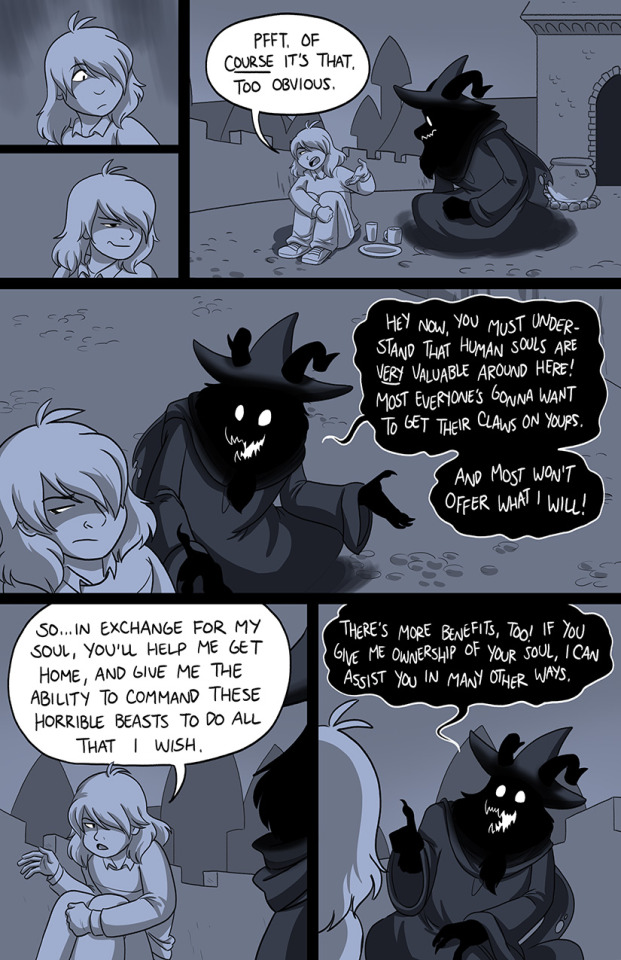
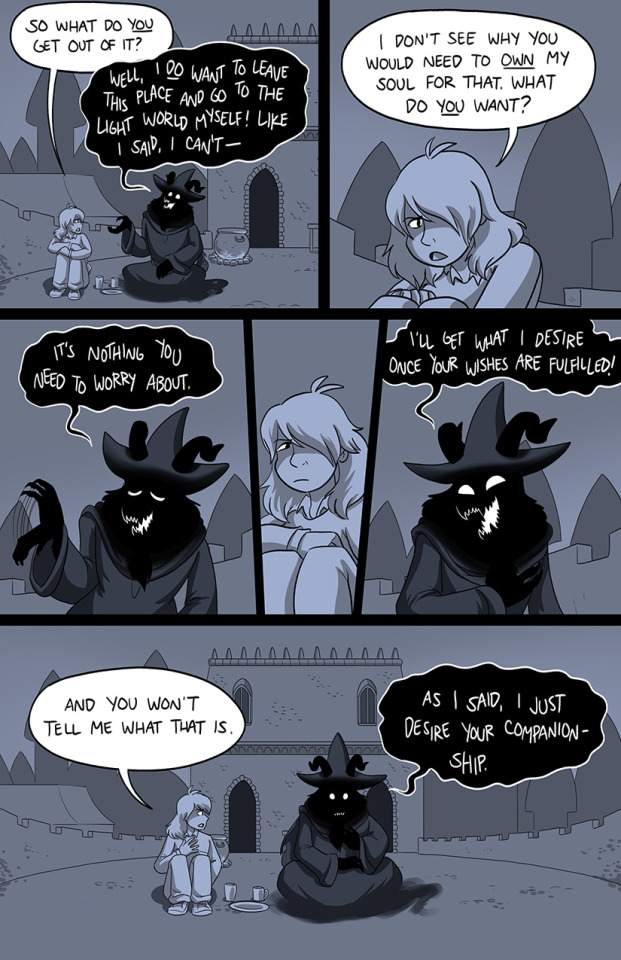

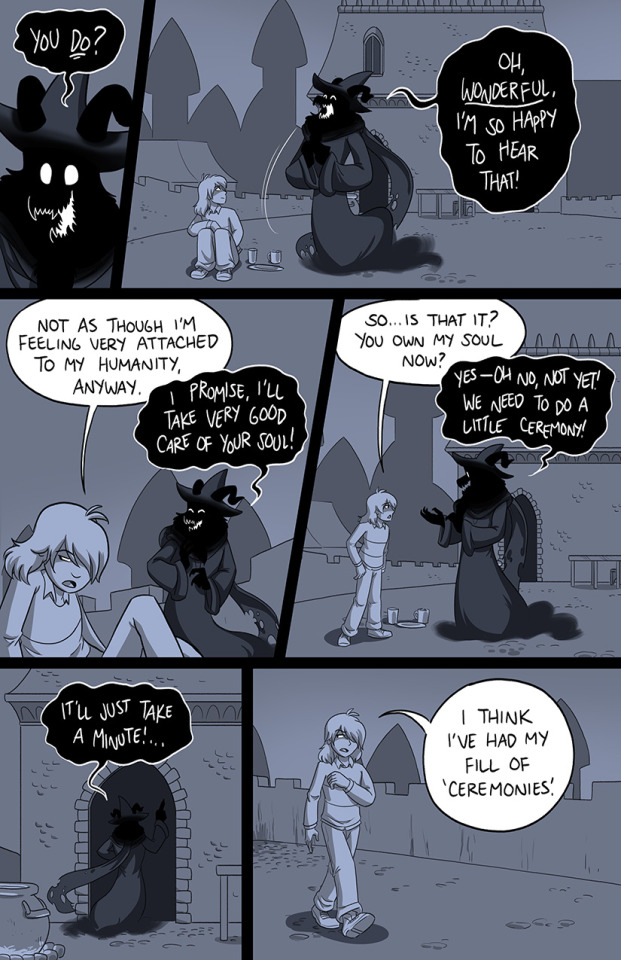
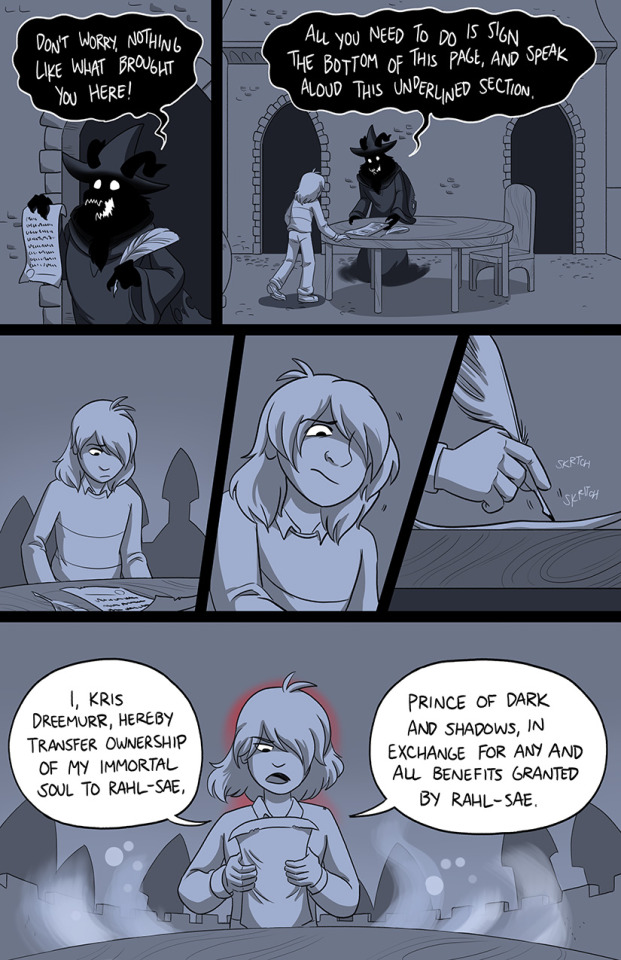
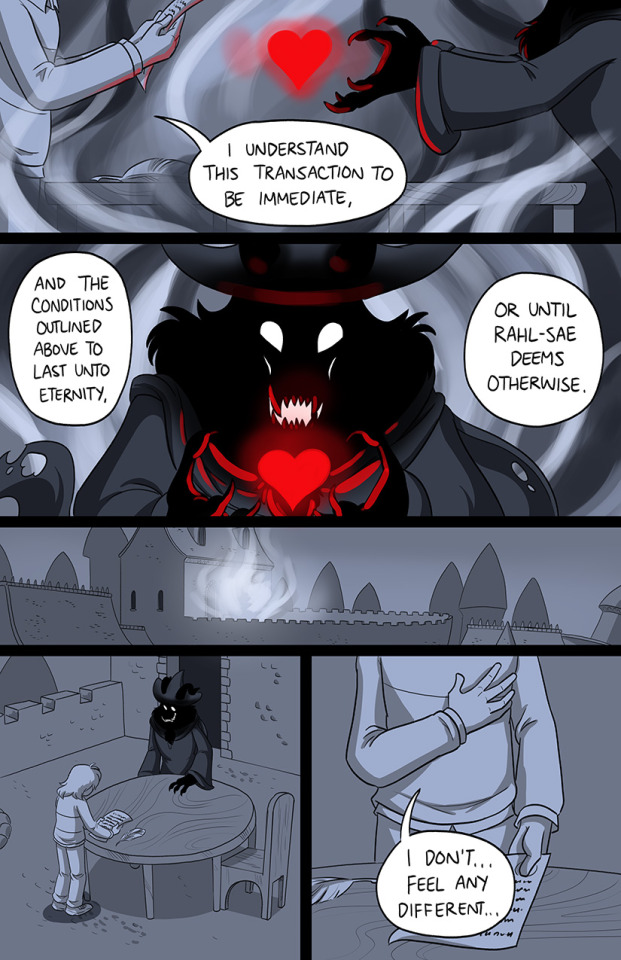
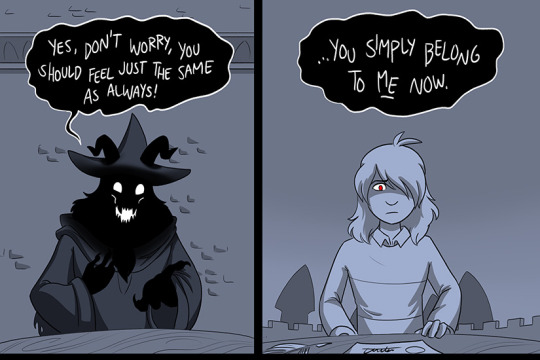
Eldritchrune - A Dark Bargain
1 | 2 | 3
Story Setup Eldritchrune Masterpost Kris is skeptical at first, but ultimately decides to give up their soul. What this means for their eventual future is yet to be seen!
#lynx art#Eldritchrune#deltarune au#ralsei#kris#are there like...warnings needed for selling souls? IDK#also I realized after drawing this that this is like#pretty much the same panel setup and reveal as the Deal With The Devil comic#and now I feel sheepish#similar imagery for similar sentiments I guess!#just slap the Doofenschmirtz meme on my face
2K notes
·
View notes
Text
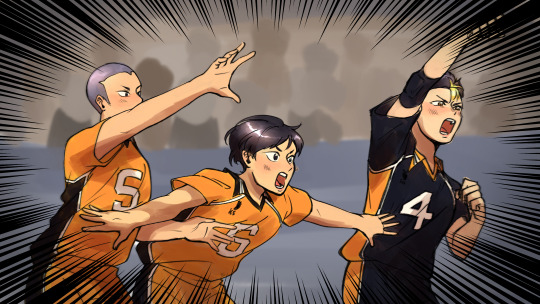
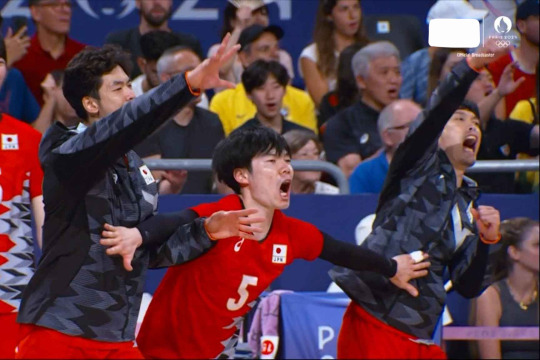
olympics 2024 men's volleyball japan vs. argentina match you will always be famous
open for better quality | no reposts
#haikyuu#tanaka ryuunosuke#ennoshita chikara#nishinoya yuu#fanart#myart#doodle#i didn't realize until afterwards that the argentina team uniforms were similar if not the same as the ones worn in the bonus chapter#it was my first time watching a real volleyball game and i'm surprised how much my hq!! knowledge carried over#the series must be pretty realistic :O#also i realized why the players who recreated that one sportiva cover stood in their positions#looking particularly at nishida who i didn't realize was a lefty until the commentator said it oops#anyway!! rearranging my schedule to watch this match live was certainly A Decision but it was worth it#it was a lot of fun!!
444 notes
·
View notes
Text
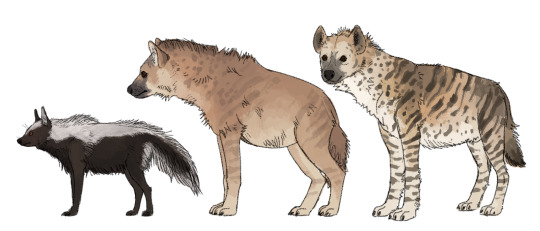
There are three hyaenids found within the Imperial Wardi region- the hisippate, the highland hyena (kyniche na chennandi), and the scrub hyena (kyniche). (None are actually related to the king hyena).
The hisippate (name is close in meaning to 'stinking one', sometimes instead called '(wild) ant-dog' ('kulichin-wannaukoma')) is very distantly related to the other two. They are small, mostly solitary animals that sleep in burrows during the day and emerge to hunt at night. They are almost exclusively insectivorous, and their diet consists primarily of termites and ants that are lapped up with a long, strong tongue. The hisippate has a wide range, with their populations being highest in grassland and savanna regions with a high density of termites.
They are named for their foul smelling anal gland secretions, which are used to mark their territory and can be sprayed short distances to repel predators. Their highly visible black and white coat (which is erected in threat display) indicates them as not worth the trouble of eating. This is partly an honest advertisement of its chemical defenses, but may function as mimicry of a substantially more threatening native badger that can spray with great accuracy at distances of up to 10 feet (while the spray of the hitsippate is untargeted and only potent within a meter of the body).
The highland and scrub hyenas are the most numerous and successful predators within the region, with their populations having exploded in the past several centuries with the decline of the Wardi lion. Both live in matriarchal clan structures with strict dominance hierarchies, maintained not by individual size and strength but by highly complex networks of coalitions. All members of a clan can reproduce, and young inherit rank positions just beneath that of their mothers. Most males eventually disperse, entering into new clans at the very bottom of their hierarchy. They exhibit no obvious sexual dimorphism, and females often can only be differentiated from males by the shape of their pseudopenis.
The scrub hyena is most widely distributed and can be found throughout most of the region in a variety of lowland habitats, faring best in savannah and open grassland with high populations of grazing ungulates. This species is distinguished by well-defined spots and stripes and a sparse mane, though their coloration varies by individual and population, ranging from reddish to pale white-brown. Their clans can number upwards of a hundred individuals in the most prey-dense territories, though most are smaller.
The highland hyena is unique to the northwest of the region. As the name suggests, they have specialized into surviving in higher altitude climes, but can also be found in the remaining pockets of surrounding forest (and once had a much larger range across the former northern forests). Their spotting is often less visible than their lowland relatives, though their base coloration is similarly variable. Their clan sizes are substantially smaller than the scrub hyena, as they inhabit regions with much lower prey densities.
Both are closely related (whether they are subspecies or separate species would be subject of debate by taxonomists) and can produce viable young. Heavily hybridized populations are common where their ranges overlap. Scrub hyenas appear to breed more readily with dispersing male highland hyenas than the reverse.
Hyenas occupy an overall minor space in most of the Wardi cultural sphere. They are noted negatively as man/corpse eaters, but are generally regarded as intelligent and powerful predators and avoid the stigma attached to man-eating scavengers. In most cases they are not ascribed much significance in comparison to the venerated lion or the massive and intimidating king-hyena, mostly being relegated to a threat to livestock and potential danger to lone travelers.
Many urban areas in the province of Godsmouth (including the outer unwalled portions of the eponymous city) have unique practices of not only tolerating but actively inviting scrub hyenas into urban spaces. These urban hyena populations have been genetically semi-isolated from their wilder counterparts for several centuries. Rather than hunting large prey, they fill similar roles to feral dogs in the urban landscape as cleaners of refuse and killers of pests, and benefit from their species being culturally regarded as powerful predators rather than lowly scavengers. They notably predate on the considerably more reviled feral dogs, and keep their populations much lower than other parts of the region. Their role is regarded as both a physically and spiritually cleansing force, with their presence neutralizing polluting elements (while not being sacred in of itself).
The Godsmouth hyenas show little fear of humans compared to their wild relatives, though their activity peaks at nighttime hours to avoid close contact. They are sometimes raised from cubs to be fully tamed (though are not truly domesticated) and used as guards or to assist in hunting (Godsmouth's designated dog hunters notably have traditions of keeping hyenas). This practice is essentially exclusive to the province of Godsmouth- hyenas rarely establish semi-urban populations in other parts of the region, and those who do have considerably greater fear of humans, usually sneaking in under the cover of night to feed on scraps and fleeing from encounters.
The status of hyenas varies in the other groups native to the region. For example:
Hyenas have a generally favorable status to the Cholemdinae, who have traditionally reckoned them as highest among predators, noting their stamina and intelligence. Body parts of hyenas are ascribed the ability to increase the wearer's stamina, and amulets carved from hyena bones are often worn while persistence hunting. Children born while hyenas are heard crying are considered to be strong and very likely to survive infancy (and will often be given names referencing the animals). The apparent androgyny of hyenas is allegorically attributed to the creation story- the first beings were dual-sexed, and split into male and female halves as part of their punishment for the theft of fire from the sun. The hyena escaped this punishment by digging into the underworld to hide and getting only its once long, luxurious tail chopped off (which was sticking out from the hole).
((TANGENT: The South Wardi have more recent common cultural ancestry to the Cholemdinae than to most of the other groups assimilated into the collective Wardi nationality. The notion of hyenas once having long, flowing tails that got chopped off in some mishap still appears in South Wardi animal folktales))
They have a largely disfavorable reputation to the Hill Tribes, and are generally regarded as gluttonous and brutish in nature. The Highlands have a naturally lower density of wild ungulates, made far lower by most grazing pasture being occupied by livestock. This causes hyenas (and other large predators) to more frequently predate on domestic animals, and thus places them directly in conflict with herders (and also makes them common rabies vectors). They are readily culled when found in proximity to villages. Hyena pelts are generally considered worthless, and culled hyenas will often be fed whole to livestock guardian dogs and their pups in hopes of teaching them to be fearless towards the predators. Were-hyenas appear in folklore- among the southwestern Hill Tribes they are most commonly the accursed spirits of cannibals, while in the northeast they are malicious witches who learned secret arts of transformation and take on these forms to wreak havoc upon their enemies.
#The scrub and highland hyenas are pretty much 1:1 with spotted hyenas in behavior. Same thing I just gave hyenas#a wider range and diversity in this setting (comparable to ancient hyena ranges that strecthed across eurasia) because I like them#Hisippate are very similar to aardwolves but smaller and more specialized into using their scent glands as a defense mechanism#creatures#imperial wardin#cholemdinae#hill tribes
227 notes
·
View notes
Text
redrawing jamil's r cards in my (usual low-effort) style 😤💪




also the sr cards but i gave up on coloring (especially robes because this is just supposed to be quick and i’m NOT attempting those patterns 😭)




#i feel like i havent drawn jamil by himself in like 18427129 years#he wanted his spotlight smh#also his pe uniform card is SO funny to me#why does he pose so. awkward 😭#it gives “👉👈” vibes but he's trying to counterbalance it with that expression#[—✦-#-✧ my art#twst#twisted wonderland#twst art#jamil viper#-✦—]#also putting them side by side makes me notice how different i draw him from the original#it’s pretty fun to look at even though i don’t exactly deviate too much from the original#i think i focus a lot on facial features#like face shape and nose shape and drawing them as similar as possible but at the same time doing my own take#but idk#i think i’ve still yet to perfect a consistent style for him
167 notes
·
View notes
Note
Hello, I'm not sure if you're aware, but tumblr is going to start helping midjourney gather data for their AI. You're one of the artists I follow here pretty actively and I wanted to warn you to maybe start nighshading your art before posting it here so it doesn't get swept up!
I've seen a couple of posts about it. Feeling disappointed but not that surprised. Also not excited about having to start nightshading/glazing my pieces but if there isn't going to be any serious regulations regarding data scraping and ai "art", there aren't a lot of choices.
Thank you for taking the time to warn me just in case, it was very thoughtful of you!
#from what I've seen the effectiveness of nightshade/glaze has been debated and I don't even pretend to understand how it works#but like watermarks it's at least some kind of preventive measure a token effort to stop your art from being stolen and misused#but I fear that if someone is determined to do it anyway chances are they will find a way unfortunately#this shouldn't be the reality of trying to share art online#it's a pretty dismal situation when this responsibility falls on the artists themselves#I've been here since 2011 I've lived through multiple tumblr apocalypses I'm not leaving unless they make this place wholly unlivable#and I don't think there are truly good alternatives with similar sense of community and as varied posting and customization options#it seems like every other major social media platform is doing this exact same thing if not worse#answered#ohdeergood#I'm tired we're all tired of this
418 notes
·
View notes
Text









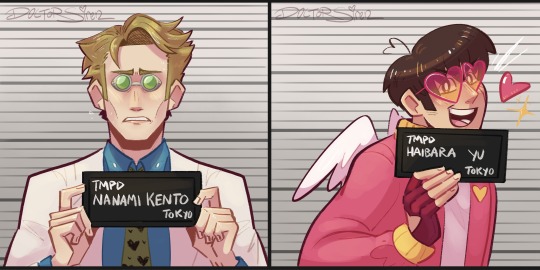


Like with any media I get into, an AU is sure to follow, so here’s something @sleepysquib and I have been cooking up!
We wanted Haibara to live, that was it :D
Here’s a “brief” summary of his whole deal:
During August 2007, his second year at Tokyo Jujutsu High School, he went on a mission with fellow second year Nanami Kento. The mission’s level turned out to be higher than expected. Haibara received critical wounds, but was able to escape with Nanami with their lives. He was healed by Shoko’s reverse curse healing technique.
After his brush with death, he realized that he needed to be taking this more seriously. That, combined with Geto’s betrayal, led him to becoming less naive. However, he didn’t want to lose his positivity, so he focused on increasing his abilities through his emotions, eventually becoming promoted to Grade 1.
After graduation, Nanami still ran from the life of a jujutsu sorcerer, while Haibara stayed in that world. He saw his role as something akin to a superhero, and took it in stride, calling himself “Cupid” and being very public about his status. He quickly became popular and gained a fanbase, taking pictures and signing autographs for them when he has time.
Being received well by the media and being good on camera, Haibara became somewhat of a PR boy for the jujutsu sorcerers. He could make a bad situation sound less terrible through his natural charm.
Nanami and Haibara remained best friends during the time that Nanami was working as a salaryman. Eventually, Nanami learned the bakery lesson and realized his place was as a sorcerer. He returned to that life and was quickly paired with Haibara for many missions.
Haibara knows that the world isn’t the happy place he wishes, but he tries to be the change he wants to see and spreads positivity. He also does this in hopes of lessening the amount of cursed spirits created by the negative emotions of humans.
As a result of always expressing positivity, his negative emotions are naturally bottled up. He does this on purpose, stockpiling his negative emotions so he can release and harness their power if a battle becomes that dire. His last resort is to unleash his negative emotions, which increases his power greatly for a brief period of time. After this burst of power, he is left exhausted and drained and will need to recover. He is aware that he is being “toxically positive” but does so to increase his power with negativity later.
He doesn’t express joy all the time and doesn’t force himself to express it every moment of the day, but he will always express positivity in public and during battles to keep up morale and his image (although he doesn’t care about image in a narcissistic way).
He is liked by most people and others vent and confide in him. The personal sharing of their negative emotions adds to that stockpile that he can use if necessary.
Haibara tries to not express his own negative emotions to others because it will decrease that stockpile inside and he knows he needs to save that for dangerous battles. He knows it’s not healthy but he does it for the good of Japan, seeing himself as a superhero.
Much like a cursed spirit, his greater power increases when those around him have expressed negative emotions, but he doesn’t like to acknowledge the fact that he has something in common with cursed spirits.
Lives by the mottos of “With great power comes great responsibility” and “greet the world with open arms”
#doctorsiren#jujutsu kaisen#haibara yu#nanami kento#gojo satoru#jjk spoilers#jjk fanart#jjk au#will come up with an AU name later#digital art#my art#procreate#long post#he’s haibarbie and he’s ken(to)…#also yeah Haibara died the same month Miku was released so uhh only explanation is that Miku is the digital reincarnation of Haibara#I DID NOT INTEND FOR HIM TO LOOK LIKE GRIAN CUTEGUY IT WAS AN ACCIDENT#his colour scheme and outfit are also accidentally pretty similar to my design for SU Future Crystal Gem Spinel#ALSO jjk’s power stuff is so technical and so I just tried my best to make something that felt like it could fit kind of#the last drawing was a quick one I did last week between two of my classes before I made a solid design for him#his goofy ahh impractical bow 🫶💘 my little celebrity /silly#he probably knows Takada and this fact makes him a person of interest to Todo /silly#big fan of his colour palette like seriously this is something I would 10000% wear if I owned it#he’s like that meme of ‘my daughter loves him. I think he looks a little gay but whatever makes my princess happy 😊’#I also thought Nanami still needed to learn the whole bakery lesson so I still had him run away#bro probably thought Geto could be redeemed ☹️😵💫😭#he didn’t have a birthday so uh made his Valentine’s Day bc if Nanami’s can be 7/3 then I can make Haibara’s be Feb 14 😌#also yes he gave that tie to Nanami#close enough! welcome back Mumbo Jumbo and Grian!
86 notes
·
View notes
Text















i love it when they sync up
#but their expressions still usually being pretty distinct#ford having the tendency to look really owl like which folks noticed immediately#even tho we've been seeing that same nose all series#gravity falls#stan pines#stanley pines#ford pines#stanford pines#i gotta do a similar post for the kids cos an aspect of carpet diem i love is it being clear that#they switched bodies just from their expressions and mannerisms alone#......also kinda reminded of sonic boom and man it would've been fun for the vas to try mimicking each other#(kinda wish the same for bill possessing dipper too)
116 notes
·
View notes
Text
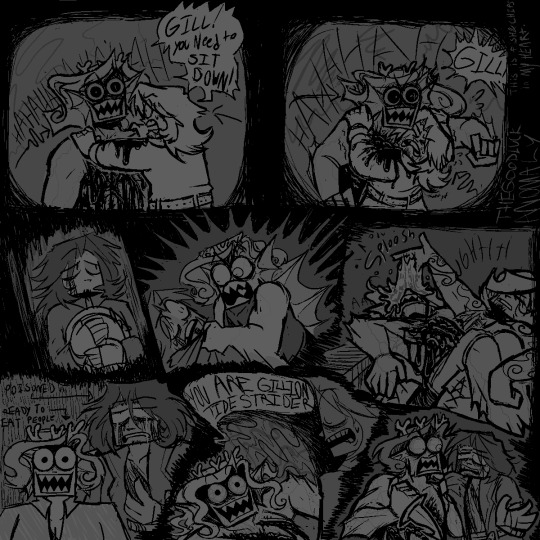
[OLD ART ALERT] A COLLECTION OF SCENES FROM THE GILLIONS CATSCRATCH ARC THAT BROUGHT ME GREAT JOY. i love fishy chips especially when its just gillion being delirious and violent and hostile
#jrwi fanart#jrwi show#jrwi riptide#jrwi riptide spoilers#JUST NOTICED A MILLION MISTAKES FUUUUUUUUCK BUT WWHATEVERRRRR IF I STARE AT THIS ANYMORE IM GONNA HHUURRRLLL#SO I REALLY LIKE FISH AND CHIPS RIGHT. IVE BEEN IN LOVE W THE SHIP EVER SINCE THAT NAT 20 KISS#BUT I THINK I SHIP IT WRONG. OR LIKE. I AM CORRECT BUT EVERYONE SHIPS THEM DIFFERENTLY#THE FISH N CHIPS I SEE EVERYWHERE ELSE IS SO FLOWERY AND SWEET AND ROMANTIC. AND THATS NICE! THAT STUFFS NEAT#but gillion and chip would NEVERRRR enter anything similar to a romantic relationship. chips too damaged and gillions too uninterested#I LIKE MY FISH N CHIPS ONE SIDED AS FUCK#bc 2 gillion chip is his best friend in the whole wide world but hes also kinduvagross little man that took him a MINUTE to really warm up2#but to CHIP gillion is this powerful and gorgeous and heroic paragon of destiny and his best friend in the whole world who will#bring about the eschaton. 'i didnt believe in destiny until i met you' until i met a champion radiating with a light thatll alter the world#OHH REMEMBER THE FIRST ICE ARENA?he was so mad.still probably shaking from the ordeal.NEVER had he felt true divine radiance CLEAVE through#his SOUL like that.do you remember that moment in the forest w the bugs. an alien from the ocean; lacerating the land w lightning#when the realization flickered in chip for a moment.that the thing standing before him was more powerful than he could ever fathom#remember when grizz mentioned that the nat20 kiss was the 'best kiss chip ever experienced'. that has nothing to do w this. where was i.#LOST MY TRAIN OF THOUGHT. BUT HEY. I THINK at the beginning chip absolutely knew that gill was smth grand n powerful n scary#when gillion revealed what exactly the prophecy was;chip got defensive and mad.sure he was sleep deprived but OOH. HES SCARED!#he believes gillion too! he believes that his destiny is to eradicate either the sea or land and that scares him!#but then he gets past it bc ultimately he trusts his bestfriend gillion so so much. he fuckin loves this dude.#he would throw himself intothe path of fire for this dude. he would boat across the ocean for this dude.he would build arenas for this dude#even if this dude will end half the world.even if this dude wields the power and the obligation to eradicate him at any second.#even if this dude is going to throw himself into harms way for his own comrades.even if this dude is just going to sacrifice himself.#one way or another one shall die for the other.these self-sacrificial bastards click so well with eachother!!#chip believes his body is best used to pave roads and gill believes his body is destined to pave prosperity.WHATEVER!!#i really love their dynamic!! they care for eachother so much!in MY heart tho. the icing on the cake here is the fantasy that chip is#just a bit more In Love w gillion than he realizes. like this powerful fish guy is HOT and PRETTY and KIND and FUNNY and LOYAL and STRONG#but gillion would never rly feel that same sort of attraction towards chip. its just not rly his thing. aroace as fuck man.#thats how it is in MY little heart atleast. and i sit here and play w my touys in my brain n i explore my silly lil one sided fish y chips.
230 notes
·
View notes
Text












10x06 // 12x10 // 14x04 // 15x07 // 16x01
#iasip#it's always sunny in philadelphia#charlie kelly#dennis reynolds#charden#mmmmmmmmmmmhmmmhm#it's so interesting to me that charlie has lagged behind dennis pretty consistently but taken a very similar path#dennis' 10 to 12 arc is charlie's 14 to 16 arc#also very interesting to me that they are both present in almost every one of these scenes.#guys who are willing to step in to keep things stable for everyone#even if it means sacrificing any and all progress that they actually want for themselves#the fact that they are both actively frustrated by this and have both had big moments where they choose to Move On#where they try to have a normal life outside of the gang with a different more traditional family unit#like they both have the same frustrations and the same resigned acceptance and are the ones to say. we need to go back to normal. ouueouegh#ada speaks#i Could go ON
132 notes
·
View notes
Text
Why Kristoph Gavin Is Like That: An Essay
Alright so common sentiments I've seen regarding Kristoph are "Why is he like that" and "I want to study him in a lab" and I am a psychology nerd, so I decided to analyze Kristoph. Obligatory disclaimer: I am not a psychologist. Wanting to analyze Kristoph's behavior may or may not have gotten me interested in criminal and forensic psychology but I am not a psychologist. I am simply a guy who likes to psychoanalyze fictional characters from the most clinical perspective I can get to without actually being a psychologist. So let's begin.
Part 1: Diagnosing Kristoph Gavin
The thing about Kristoph is I think to fundamentally understand him, you need to diagnose him. In fact, I haven't posted my analysis of Kristoph's black Psyche-Locks because of it. As I said, I'm not a psychologist, but I do enjoy looking through the DSM-5 every once in a while, so I'm going off of that.
When you first look at Kristoph's behavior, you would (understandably) say he's a narcissist. From a purely colloquial perspective, this is absolutely true. However, I also think he very likely has narcissistic personality disorder. To be completely clear, I don't think his behavior is inherently a result of this. I think his behavior is a result of realizing he has a problem (even if he doesn't realize it's narcissism, he does acknowledge that he's fucked up because the reason he gives for killing Zak is "I am an evil human being") and not bothering to get help for it. In fact I'd argue he embraces it. So let's go through the DSM-5's diagnostic criteria for NPD (I don't need to explain where most of these are applicable but I'm going to anyway).
Criterion 1: Has a grandiose sense of self-importance (e.g., exaggerates achievements and talents, expects to be recognized as superior without commensurate achievements) - While I don't personally think the examples provided by the DSM-5 are reflective of Kristoph's behavior (although I think an argument could be made about him exaggerating his achievements, depending on if you think he was forging evidence before the Gramarye trial, which I personally do but I'll get into that later) I absolutely think he has a grandiose sense of self-importance because he canonically has a god complex, which is implied to be why he became a defense attorney; by doing that, he made people depend on him and literally had people's lives in his hands.
Criterion 2: Is preoccupied with fantasies of unlimited success, power, brilliance, beauty, or ideal love - I don't really know exactly how applicable this is, and it might've been more applicable when he was younger. However, he was so determined to get a win over Klavier in Klavier's first trial to forge evidence over it, so there's something to be said about him having a preoccupation with success not unlike Manfred I think.
Criterion 3: Believes that he or she is “special” and unique and can only be understood by, or should associate with, other special or high-status people (or institutions) - He literally says this himself. He literally says the jury is made up of "ignorant swine" and says they're soiling the courts, I don't know what else to say on this point
Criterion 4: Requires excessive admiration - I will once again point you to the implication that he became a defense attorney specifically to make people dependent on him. The judge calls him the best defense attorney in town so I think it's safe to assume he's never lost a trial (which I will bring up again later). The nanosecond it's implied Apollo is turning on him and losing admiration for him, Kristoph takes it as a fucking betrayal, specifically saying "Et tu, Justice? You would betray me, your teacher?" Reminder, this is because Apollo decided to listen to Phoenix's testimony.
Criterion 5: Has a sense of entitlement (i.e., unreasonable expectations of especially favorable treatment or automatic compliance with his or her expectations) - Can I say his cell is evidence of this? No? Alright. He seems pretty fucking upset when he's reminded he's not the defense attorney in Phoenix's case. What does this imply? He acts like he's entitled to acting as the defense attorney during the case. This in comparison to the other defense attorneys who have acted as co-counsel at some point (Mia, Diego, Phoenix, Apollo, Kazuma, Athena) who let the acting defense attorney do their damn job. Like it might even be that no other lawyer acting as co-counsel has ever acted as entitled as Kristoph does that makes it feel like Kristoph comes off as entitled in the first place (in which case, I very much think Kristoph is meant to come off as entitled during Turnabout Trump).
Criterion 6: Is interpersonally exploitative (i.e., takes advantage of others to achieve his or her own ends) - I'm not explaining this. Phoenix's disbarment hinged on this, I refuse to explain this. I already made a post about it in regards to Apollo, I'm not explaining this here
Criterion 7: Lacks empathy: is unwilling to recognize or identify with the feelings and needs of others - I think in order to be as horrible as he is, he would have to lack empathy. Idk. Like he obviously lacks empathy but I don't know how to explain it.
Criterion 8: Is often envious of others or believes that others are envious of him or her - Literally his motive for everything. He got Phoenix disbarred because he was upset over Zak firing him.
Criterion 9: Shows arrogant, haughty behaviors or attitudes - I will once again direct you to him calling the jury "ignorant swine" in Turnabout Succession.
That is 8 out of 9 criteria he definitely meets and one that's debatable. You only need to meet five of the critera to be diagnosed. The only reason one is debatable is because we don't get into Kris's head. Conclusion: "Kristoph has NPD" isn't an unreasonable assumption. Kristoph having NPD is actually why I haven't posted the analysis on his Psyche-Locks; I didn't think I could explain Kristoph having NPD well in that post and having that explanation is crucial to understanding that analysis (which will be added to this one instead of it being its own post).
As I said at the start, I do not think Kristoph having NPD makes him a horrible person. I think he knows he has a problem, and instead of getting help for it, he embraces it. He chooses not to get help and that choice and him borderline embracing his narcissistic traits is what makes him a horrible person. This is yet another thing that makes Kristoph and Klavier so interesting; Klavier exhibited similar narcissistic tendencies at 17 (although not near as bad as Kristoph) but it feels like he recognized that he had a problem and got help for it. Narcissistic personality disorder can be caused by trauma, and it wouldn't surprise me if Kristoph and Klavier had very similar yet very different responses to whatever traumatic event they experienced. In Kris's case, this resulted in NPD that he didn't get help for and arguably embraces.
Part 2: Evidence Forgery & A Perfect Trial Record
The judge explicitly refers to Kristoph as "the best defense attorney in town" when he asks about Apollo's status as the acting attorney and Apollo refers to Kristoph as a "top-notch defense attorney" when he asks Phoenix why he wanted Apollo to be his attorney. In my opinion, both of these statements would imply that Kristoph has never lost a trial. Even Phoenix has lost trials, and he basically had Kristoph's reputation before being disbarred (which has some super interesting implications actually). This is where Klavier comes into play.
For Kristoph to forge evidence to guarantee a win, he's either not as good a defense attorney as his reputation would have people believe, or he was confident Klavier had a chance to win the trial. If we really think about it, I think the first option, that Kristoph just isn't as good a defense attorney as people think, is more likely, and this also leads into the evidence forgery discussion. He had no qualms about spending $100k on forged evidence. This implies one of two things; either he's forged evidence before or he's von Karma levels of rich. I think it's much more likely that Kristoph forges evidence to make up for the fact that he's not actually as good a defense attorney as people think he is.
He's a year younger than Phoenix, so if we assume he became a defense attorney at the same age as Phoenix (24), he'd already been a defense attorney for two years at that point. Going a bit further, if we assume he became a defense attorney at the same age as Apollo (22) instead, then he'd been an attorney for four years by the time Zak's trial was happening (and he had been an attorney long enough by Zak's trial to be well known, as Klavier says "Ah, figures my bro's more famous in this part of town" when the judge asks if Klavier and Kristoph are related). There's plenty of room for him to forge evidence there, as long as the decisive evidence doesn't require replication of something that would be unique, like handwriting. He could (probably) easily forge a murder weapon or a bloodstain. This would explain why he's so willing to pay $100k for a forgery too. If we keep with the assumption that he forged evidence his entire career but never had to do anything with something like handwriting, he'd probably pay an arm and a leg to get the evidence he needs.
Considering Kristoph is also willing to murder people over a seven year old case, I wouldn't be surprised if he defended people he knew were guilty. Depending on the case, he would probably have to forge evidence at some point.
Part 3: Black Psyche-Locks
Kristoph having black Psyche-Locks when he's asked about why he killed Zak is interesting. It makes a lot more sense if you keep in mind that he is a narcissist. To fully explore Kris's Psyche-Locks, we need to go back to something Spark Brushel mentions in Turnabout Succession's MASON system section.
Spark says that Kristoph started stalking everyone who could conceivably be involved in Zak's case out of paranoia. In Kristoph's brain, this was probably completely justified. His paranoia was specifically rooted in the belief that Zak would appear to someone involved in the case and expose Kristoph's forgery. Kristoph stalked Spark, he stalked Phoenix, he stalked the Mishams, I wouldn't be surprised if he (attempted to) stalk Klavier. If the fact that he forged the evidence that got Phoenix Wright disbarred ever got out, his reputation would be tarnished beyond repair, and to him, his reputation is the most important thing he has. He was so careful about how he handled the forged diary page that nobody suspected anything was even wrong with it except Klavier. All of this adds context to his Psyche-Locks being black instead of red.
I think it's incredibly likely that whether through paranoia-fueled delusion or just not being able to consciously acknowledge that he did kill Zak (which, if revealed and then investigated, could absolutely expose all of Kristoph's wrongdoings, something I think he would've realized), he genuinely didn't realize he killed Zak. I 100% think it's possible that Kristoph genuinely thought he'd killed some random guy on impulse. "But Jinx," I hear you saying, "why would he have gone after Zak if he didn't realize who he is?" As I said, I think it's possible that Kris thought he killed a random guy on impulse. He didn't plan to kill Zak. If he had, he would've been more prepared for it. I think some part of his brain recognized Zak which is what gave him the impulse in the first place, but he didn't become consciously aware of it until Turnabout Succession. Alternatively, he got so far in denial that he managed to delude himself into genuinely thinking he hadn't killed Zak, and he had just killed some rando named Shadi Smith. Phoenix didn't even recognize Zak when he introduced himself as Shadi. If Phoenix, who played poker with and defended Zak and has a picture of him in his office, didn't recognize Zak immediately, why would Kristoph?
It's also not impossible that there are multiple other murders Kristoph's committed that we don't know about. Hell, he tried to poison the Mishams after Zak's trial. At the very least I don't think that was his first time attempting murder. Kristoph's not an idiot, he's just careless (which doesn't surprise me, considering he is so convinced that if he ties his loose ends he won't get caught that he doesn't even tie his loose ends all the way, nor watch what he says in regards to murders he committed). That's not to say he's some kind of mastermind either, but he is intelligent. I don't think he could pull Simeon Saint levels of bullshit but he's very much capable of successfully and skillfully manipulating people. My point here being, if he has murdered other people before he murdered Zak and after he attempted to poison the Mishams, he probably wouldn't be surprised about having the impulse to kill some random guy, making him more inclined to believe he did just kill some guy.
I also think it's worth it to compare how Athena's Psyche-Locks broke in Dual Destinies to Kristoph's behavior. Athena was able to be eased into her Psyche-Locks breaking. She didn't have any reason not to trust the things Phoenix was saying. Kristoph is so paranoid that he doesn't trust anyone. He wouldn't have been able to have his Psyche-Locks broken because he would just deny everything that's being said until he can't deny it anymore and breaks down, something at least directly related to his paranoia, if not also his NPD. This is why I mentioned in this post that breaking Kristoph's Psyche-Locks would always be a bad idea. He'd never get to a point where he'd be able to mentally handle the truth. Kris's trust issues run so deep that he'd never trust anything anyone's saying until the damage is already done and the Psyche-Locks are broken. In Kristoph's case, there's no way to break those fuckers without causing the damage Pearl mentioned as something that'll happen if they're broken when they're not ready to be. I wouldn't be surprised if this is why Kristoph's breakdown in Turnabout Succession is so intense.
Part 4: Kristoph's Personal Relationships
For this section, I'm going to discuss each of Kristoph's relationships separately, then go into what his relationships say about him in general. So let's start.
Kristoph & Klavier
Kristoph and Klavier's dynamic is genuinely one of the most interesting in the Ace Attorney series to me.
Klavier doesn't really talk about Kristoph much, and the same sorta seems to apply to Kristoph. We don't learn anything about Klavier and Kristoph's dynamic until Turnabout Succession, and we know Kristoph didn't talk about Klavier because Apollo didn't even know Kristoph has a brother. When we do see what their dynamic was like in 2019, it's Klavier being used by Kristoph. Kristoph used Klavier to get Phoenix disbarred, and it weighed on Klavier's mind for seven years.
I also think it's worth noting the following exchange from Turnabout Succession:
Klavier: Let's clean out the family closet, eh, Kristoph? Kristoph: You're spinning out of control. Calm yourself before you say something you'll regret. Klavier: Spinning out of whose control? Mine? …Or yours?
Which implies that Kristoph exhibited some kind of controlling behavior towards Klavier. It doesn't surprise me because Kristoph's a control freak. I'd also be more surprised if Klavier wasn't afraid of Kristoph killing him at some point. Additionally, something I mentioned in my Klavier analysis is that in the 2019 section of Turnabout Succession, Klavier does have a good view of Kristoph and even seems to look up to him. He takes Kristoph at his word that Phoenix is going to present forged evidence despite (by 24 year old Klavier's account) finding it weird even then, and keeps him anonymous when he brings up the fact that Phoenix presented forged evidence. Another thing I mentioned in the aforementioned Klavier analysis is that based on Klavier's behavior, he didn't realize Kristoph was manipulating him until sometime after the 2019 section of Turnabout Succession. Something made Klavier realize he was being manipulated. Could be age or that Kristoph did something that made Klavier realize Kristoph was a piece of shit, but no matter what it was, something happened that made Klavier's view of Kristoph shift.
Kristoph & Phoenix
Kristoph and Phoenix are also really interesting to me because Kristoph's end of their friendship is fueled by paranoia, and Phoenix's side is fueled by a desire to keep Kristoph close and basically investigate him. It's toxic on both their ends, and that makes it really interesting. Their dynamic also has a really good example of "Kristoph will lash out if someone even minutely slights him" in both Phoenix's trial and Vera's.
During Phoenix's trial, Kristoph gets so upset over the trial even slightly alluding to the potential for him being present to kill Shadi that the judge has to remind him that Phoenix is his client. Phoenix is also so determined to get Kristoph caught that he forges evidence (technically twice) and revamps the entire justice system (and this was exclusively to get Kristoph caught). They're both incredibly petty with each other. I'm not really sure what to add here, they're just so toxic they should come with a radiation warning.
Kristoph & Apollo
Apollo looks up to Kristoph. Kristoph uses this to his advantage during Phoenix's trial, using the fact that Apollo is loyal to and looks up to both Kristoph and Phoenix to emotionally manipulate him. He then probably tries to use "You would betray me, your teacher?" to further manipulate him, but Apollo's desire to find the truth overrides his loyalty to Kristoph (something Apollo literally tells Kristoph).
Kristoph has one final instance of trying to emotionally manipulate Apollo; he gets Klavier to the point where he essentially shuts down then blames Klavier shutting down on Apollo. This doesn't work of course, and Apollo bulldozes on through anyway.
In general I think we can come to a pretty solid conclusion that Kristoph will either manipulate and gaslight people to get what he wants or stalks them out of an intense paranoia that's directly related to how he sees himself as a result of the NPD he didn't get treatment for. Instead of coping with things like a normal fucking person, he resorts to both physical and psychological violence and stalking.
Part 5: Conclusion
So here we are. Almost 3k words later. I do not want the takeaway from this to be "Kristoph's a manipulative, violent asshole because he's a narcissist" and if that's your takeaway you need to rethink literally everything I said here. The fact that Kristoph could be diagnosed with NPD has nothing to do with him choosing violence. NPD has nothing to do with him choosing to stalk everyone involved with Zak's trial instead of getting help for his paranoia. I want that to be perfectly clear. The thing with NPD is it can be hard for the person suffering from it to realize they have it and subsequently get help for it. Kristoph's problem isn't exactly that he has NPD. It's that he never got help for the thinking patterns the NPD caused. Had he gotten help I don't think he would've ended up stalking and murdering people. He'd still have NPD, but he wouldn't be near as fucked up.
It's why Klavier and Kristoph are so interesting as characters. Klavier has narcissistic traits but he evidently got help for them, as he's nowhere near as egotistical at 24 as he was when he was 17, although he does start exhibiting those traits again under high stress situations. He's still not completely okay mentally (otherwise he wouldn't regress like that), but he's also better than Kristoph at managing his symptoms when they do show up. Kristoph doesn't even try to get help for his symptoms, which leads to his downfall. Had he gotten help for his narcissism, he might've ended up a bit more like Klavier.
I hope Ace Attorney's prison system has a proper therapy program. I hope Kristoph's able to get help when and if he decides he wants it, because I am personally of the belief that everyone deserves help if they want it, and Kristoph's no different. I don't think he deserves to have Phoenix, Apollo, or Klavier back in his life, and I wouldn't blame any of them for never talking to him again, but that doesn't mean I don't think Kristoph deserves help. He would just have to realize he has a problem first, which I doubt happened soon after Apollo Justice and I'd frankly be surprised if it ever happens. But I hope the offer for help is there if he decides he wants it.
So why is Kristoph Like That? Untreated mental health issues that he's implied to realize is a problem.
*Again, please do not act like I'm saying Kristoph having NPD is an excuse for his actions. He chose not to get help. He chose to stalk people. He chose to kill people. Him having NPD isn't an excuse for that. My goal here was simply to answer "Why is Kristoph Gavin like that?" Do not misconstrue my intentions here or what I'm saying. Kristoph's NPD isn't what drove him to do what he did. Him choosing to embrace symptoms that hurt people did.
#ace attorney#kristoph gavin#ace attorney analysis#character analysis#apollo justice ace attorney#apollo justice spoilers#aa4#aa4 spoilers#tw stalking#tw manipulation#tw murder#tw abuse#is it obvious that i'm super nervous to post this because i said kristoph has npd#anyway be civil please#ALSO i very much think kristoph is a good example of what can happen when you dont get help for severe mental health issues#hell im experiencing it myself (although not anywhere close to the same degree as kristoph)#i have what im pretty sure is borderline personality disorder (ironically realized because of klavier)#but im not in a position where getting help is easy which is not making my life any easier#i didn't even realize it was a massive problem until i did research on what splitting looks like for a fanfiction. at which point i was lik#“huh. this sounds INCREDIBLY similar to experiences i've had. maybe i should get help for this”#take this as your cue to be like me and get help for your mental health conditions. you will (probably. hopefully) not regret it
82 notes
·
View notes